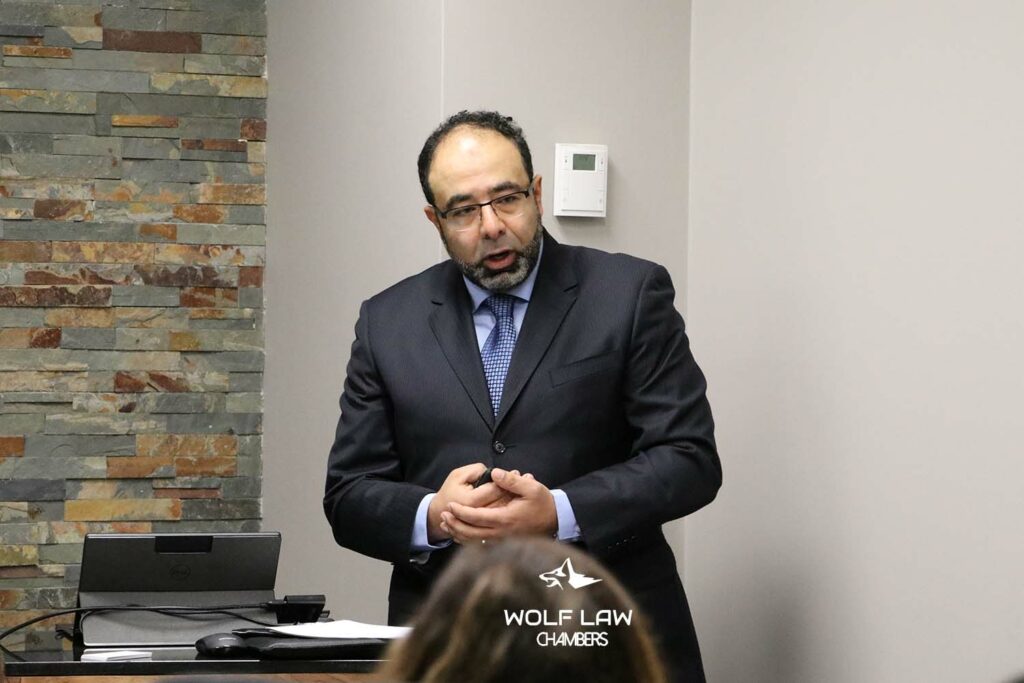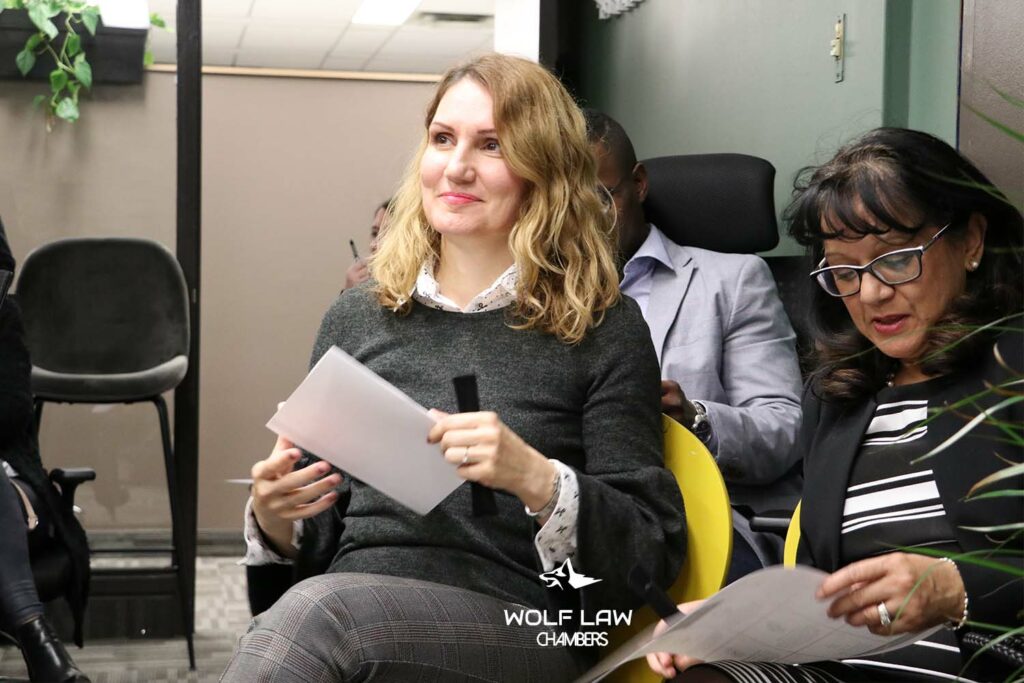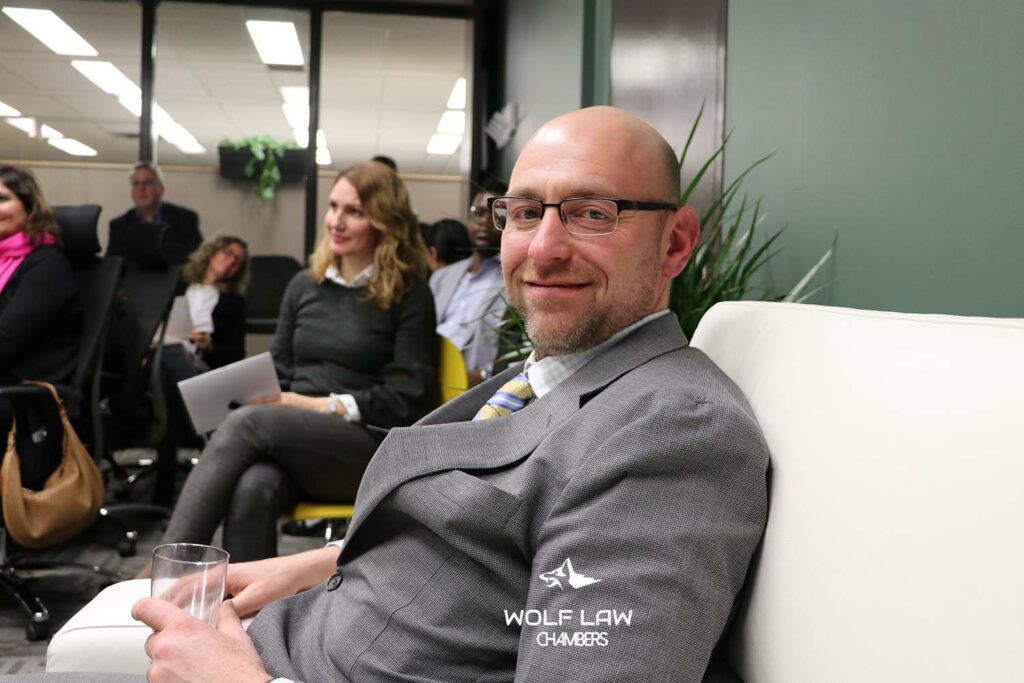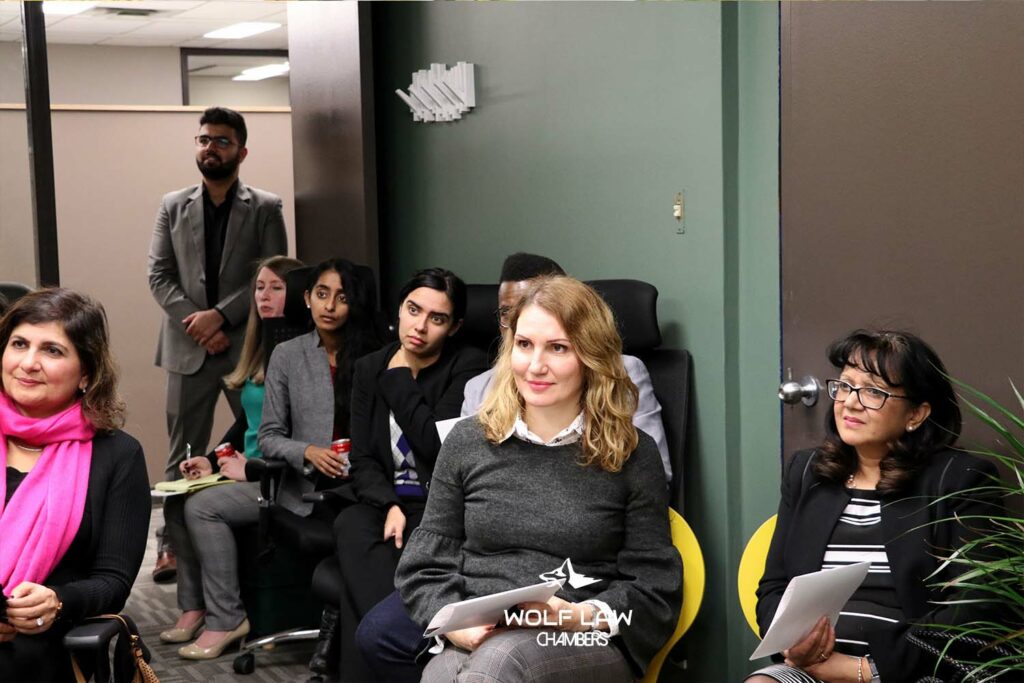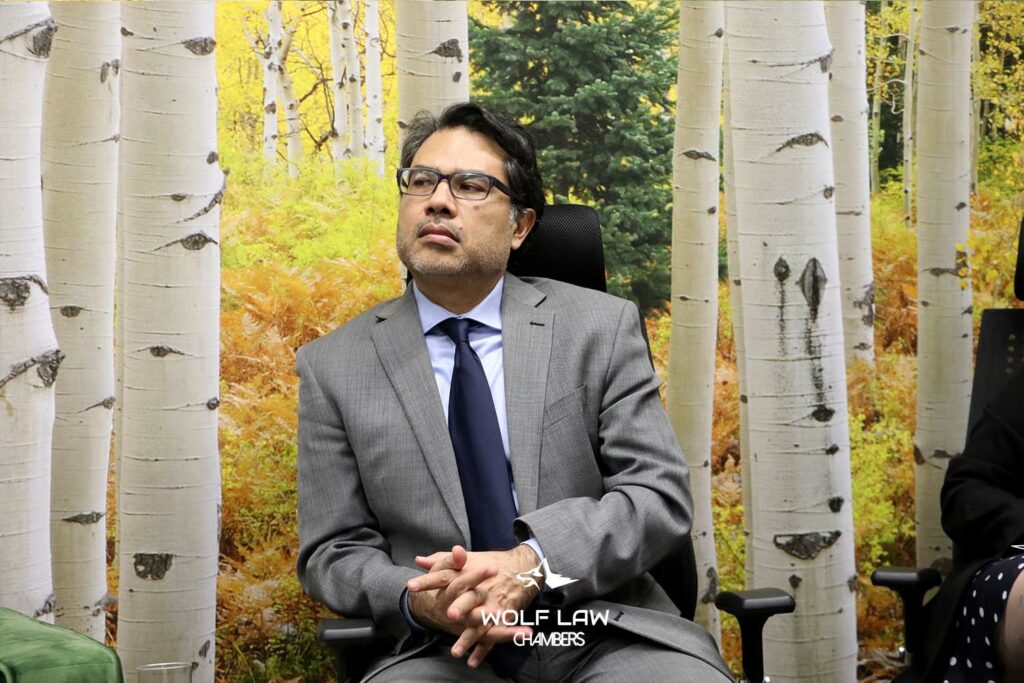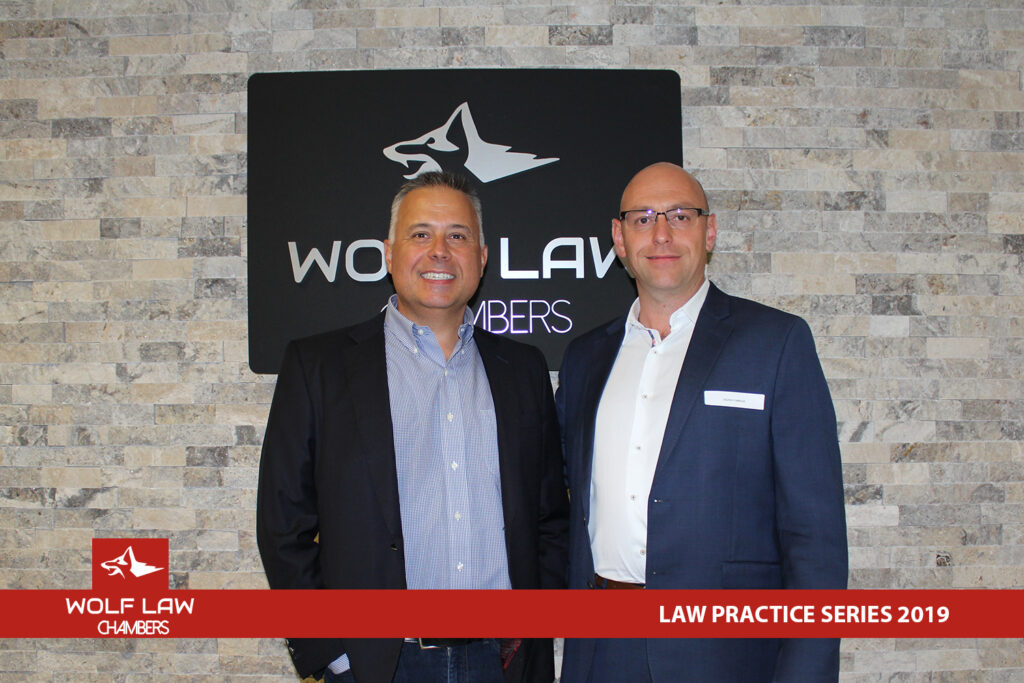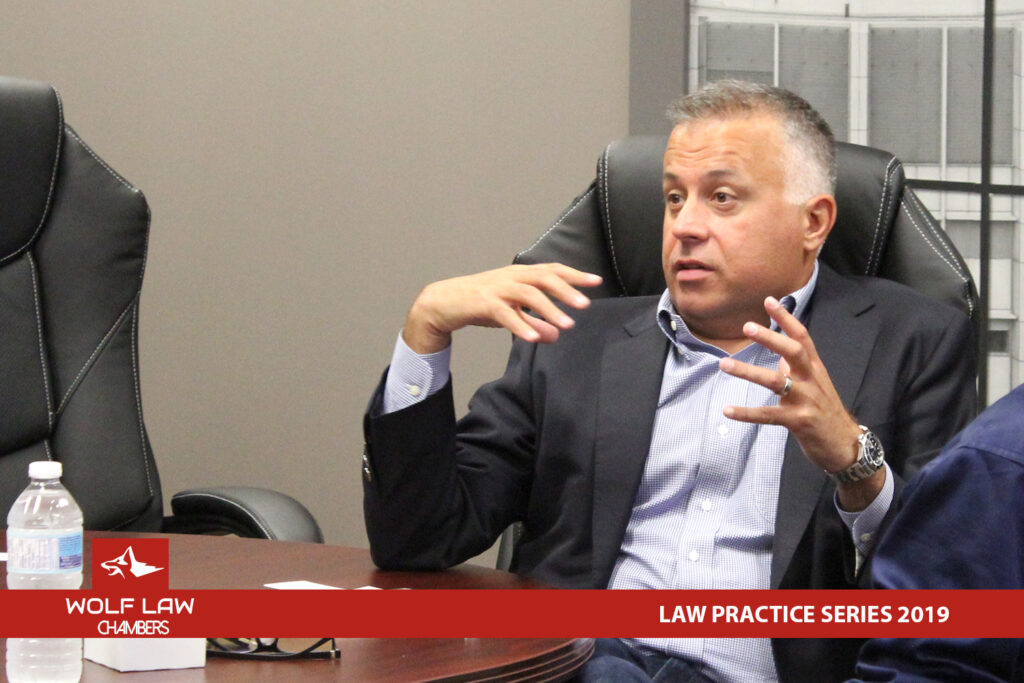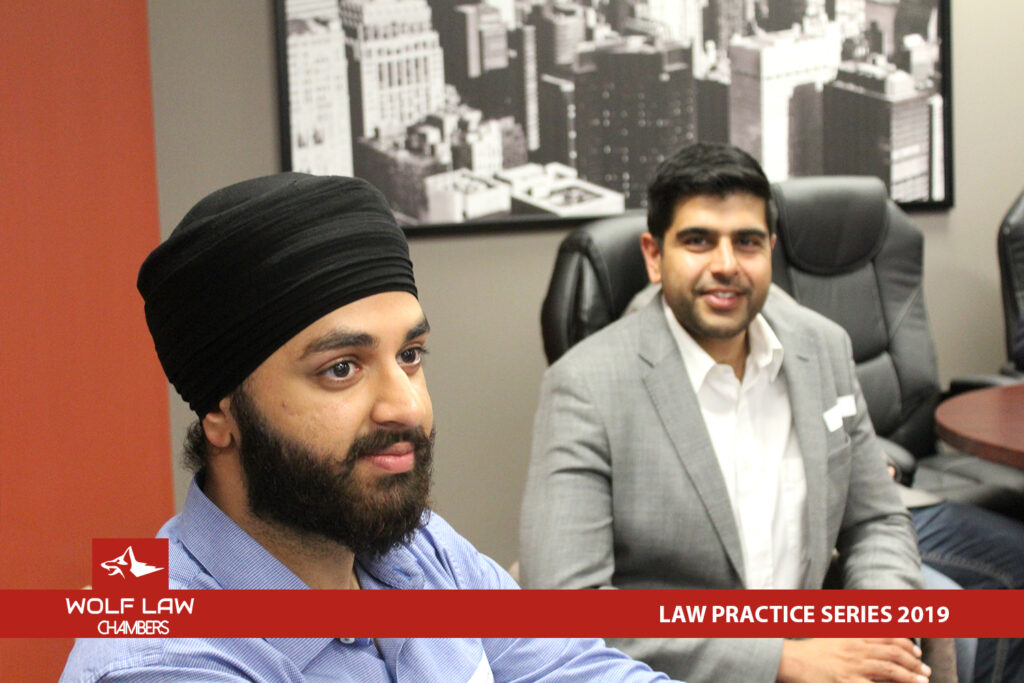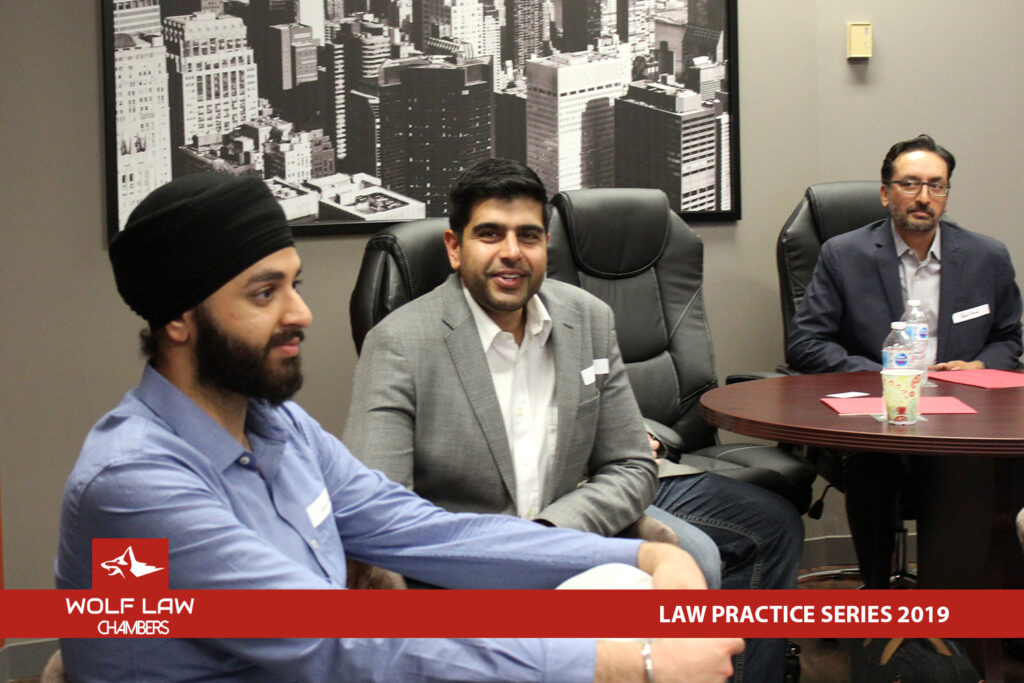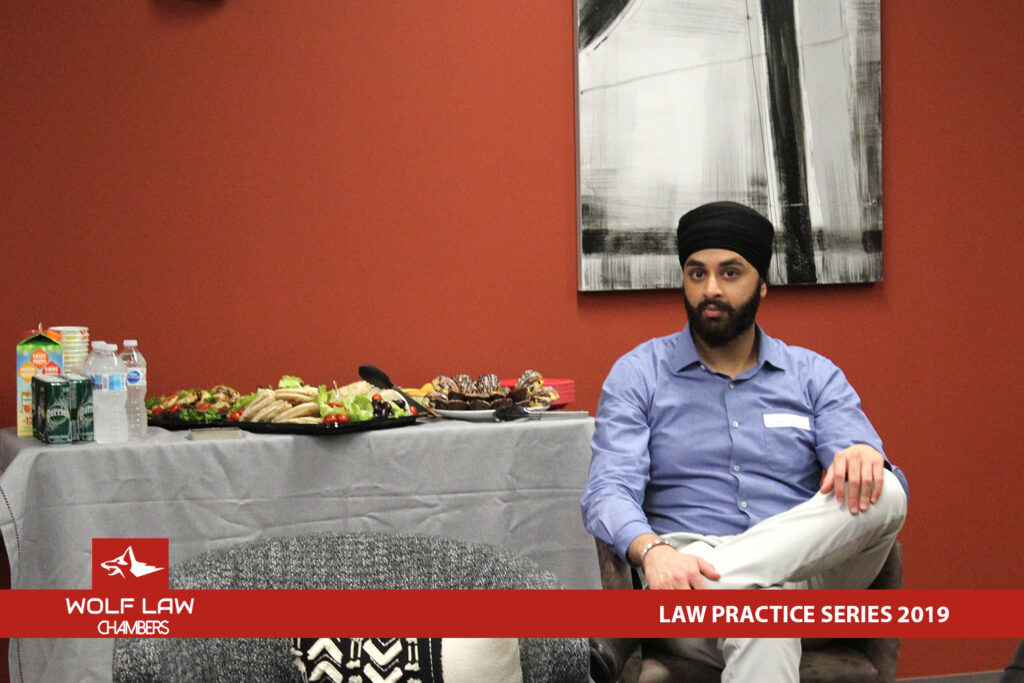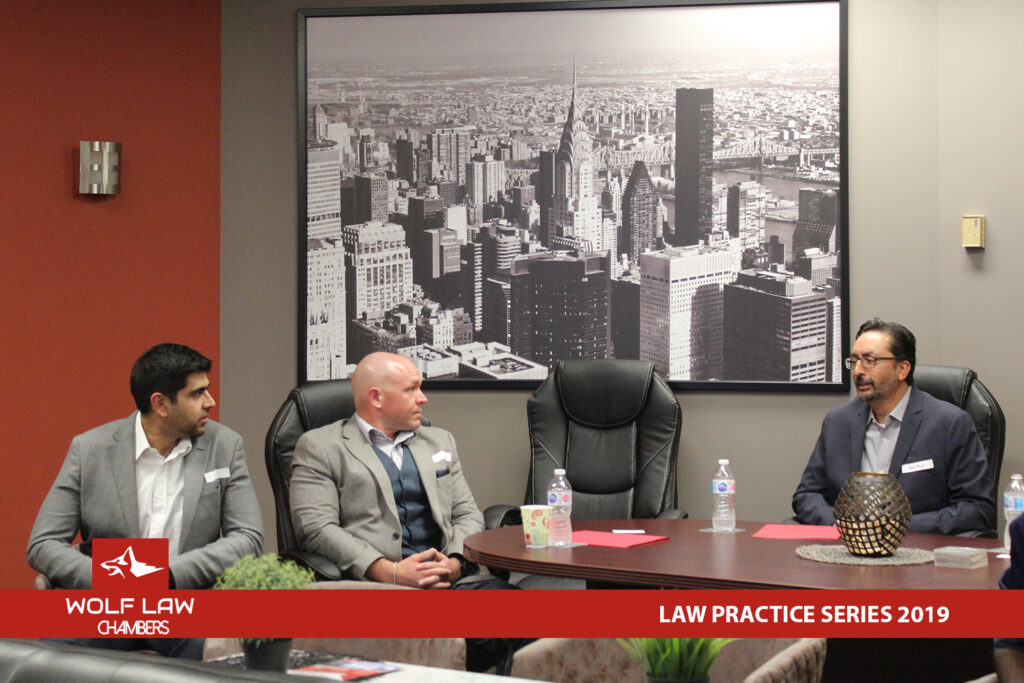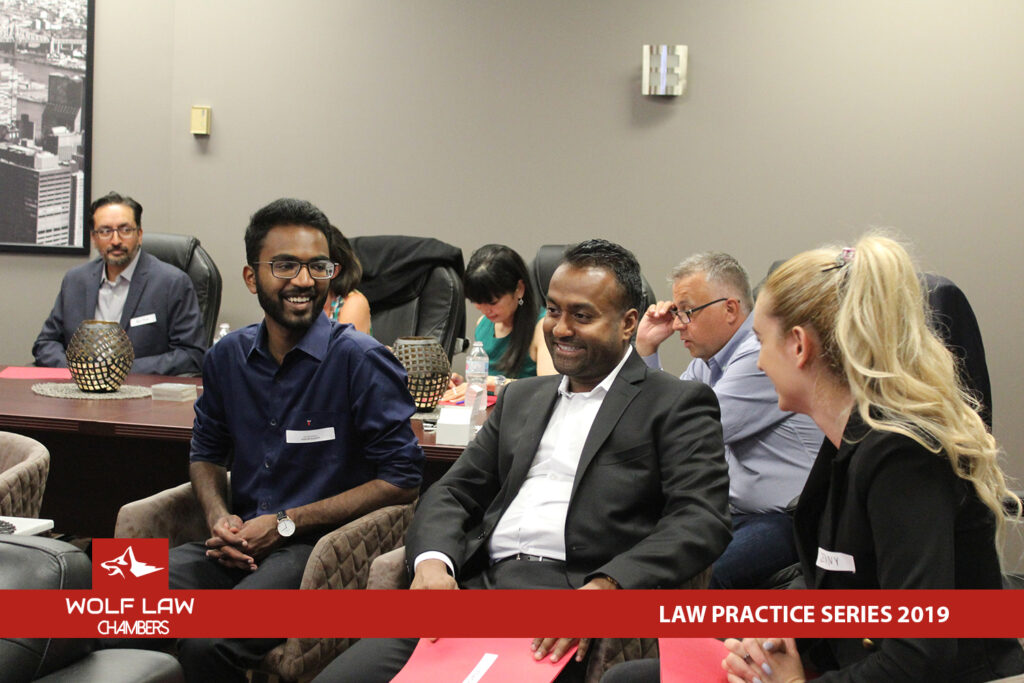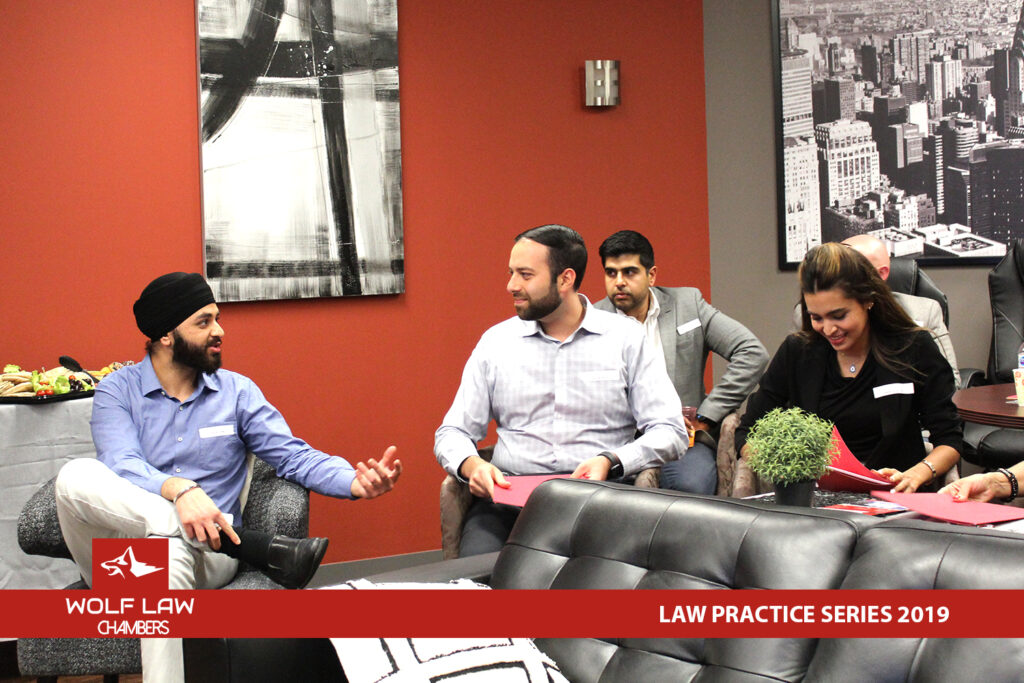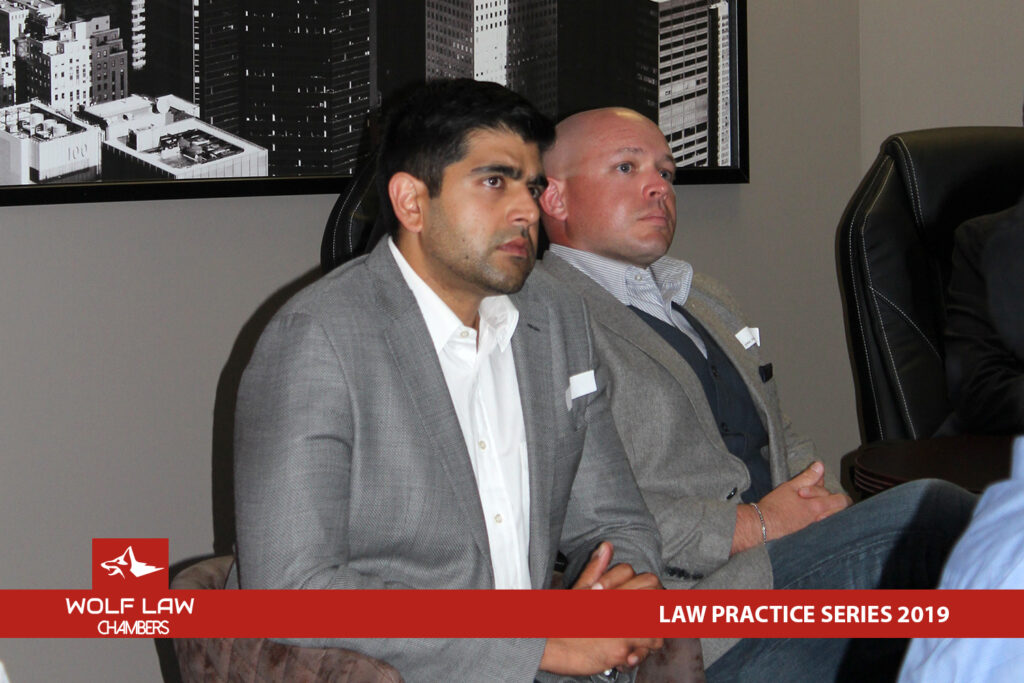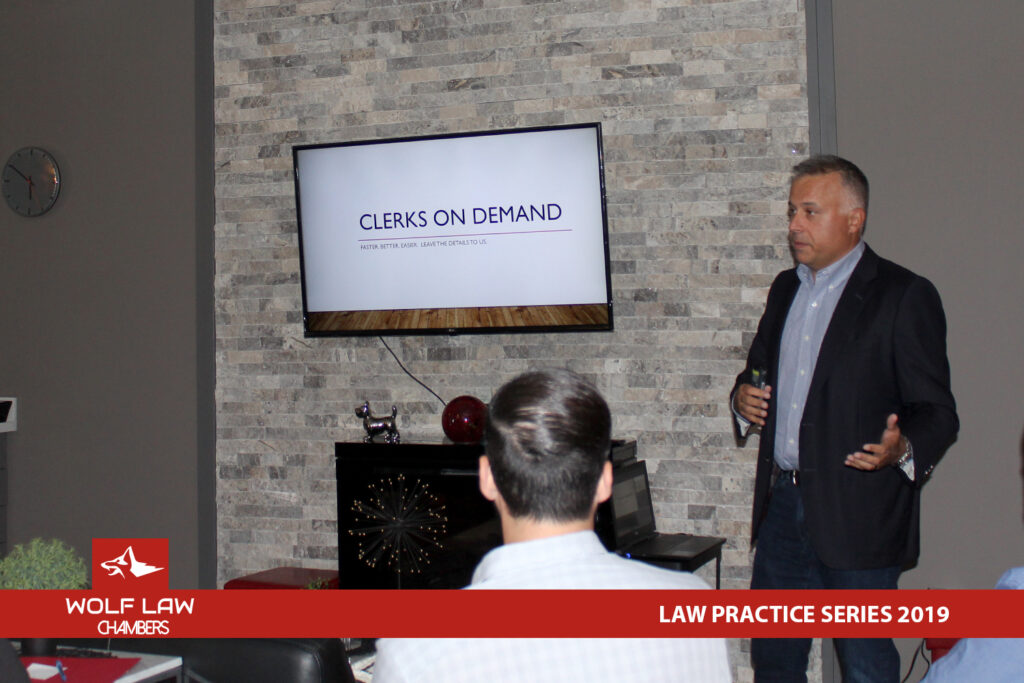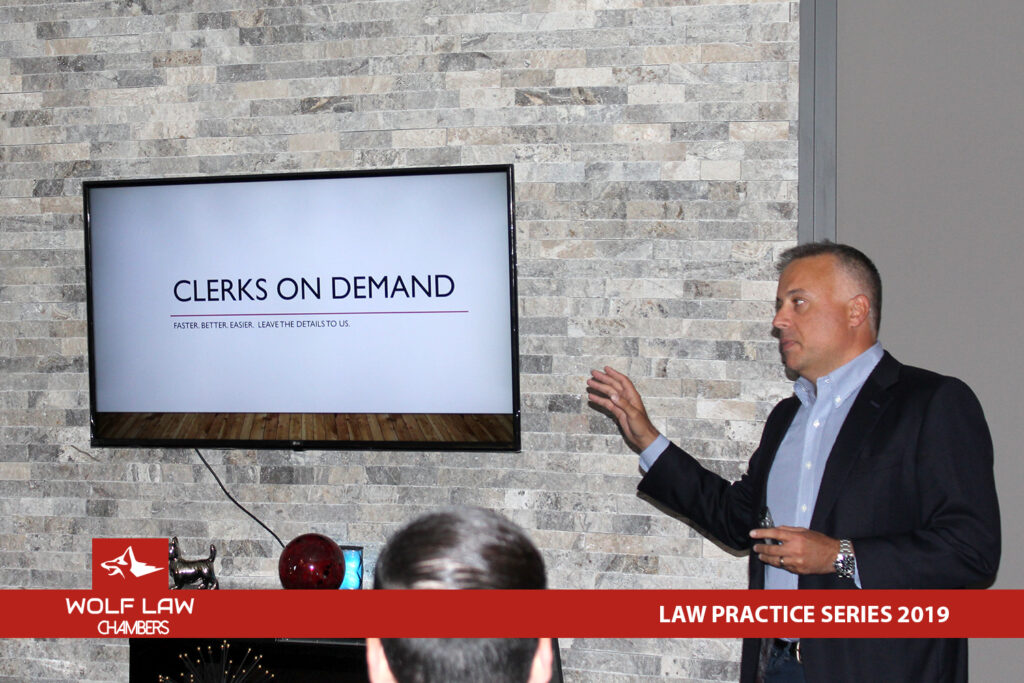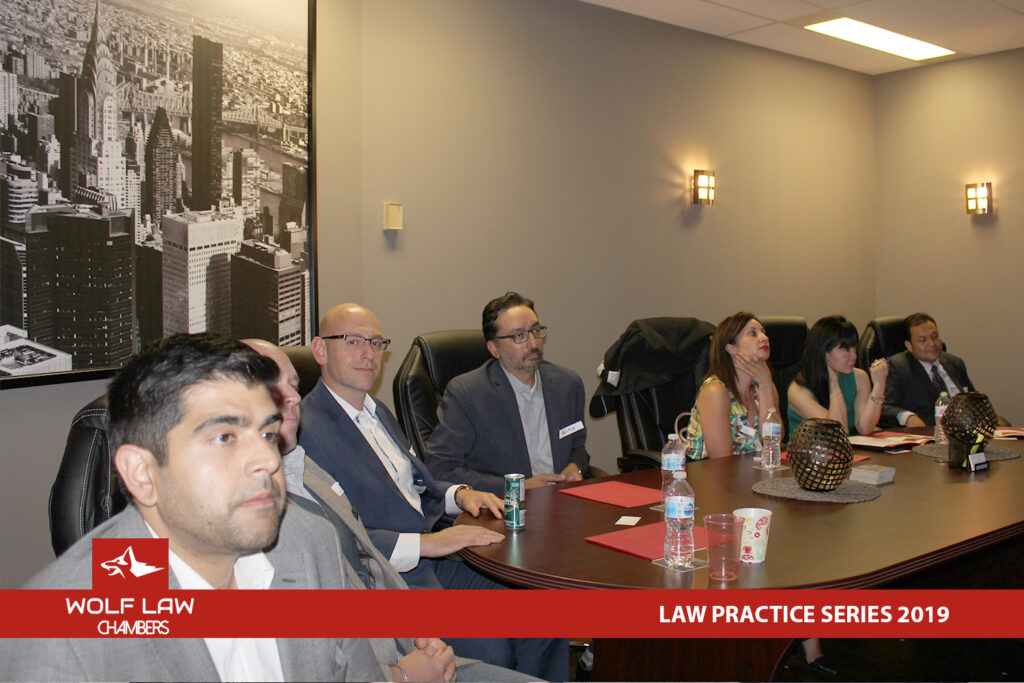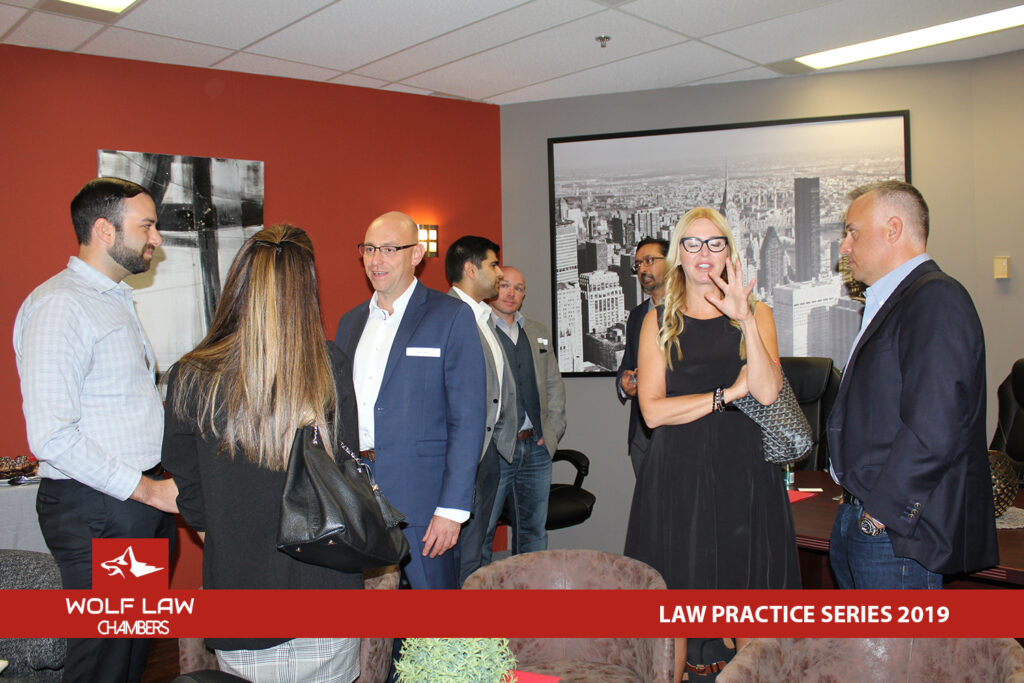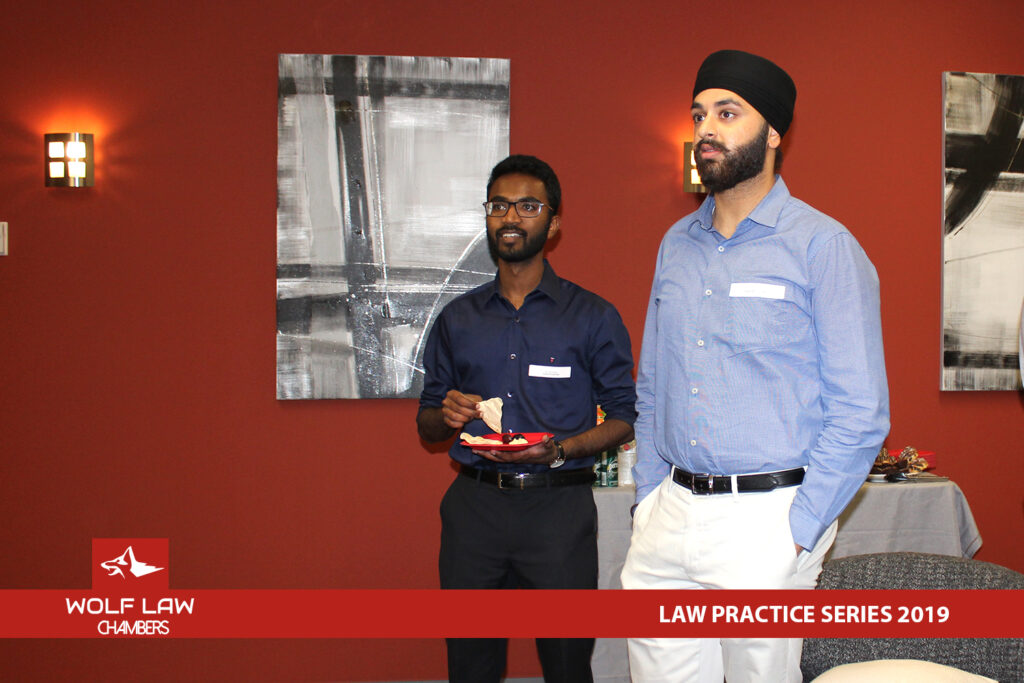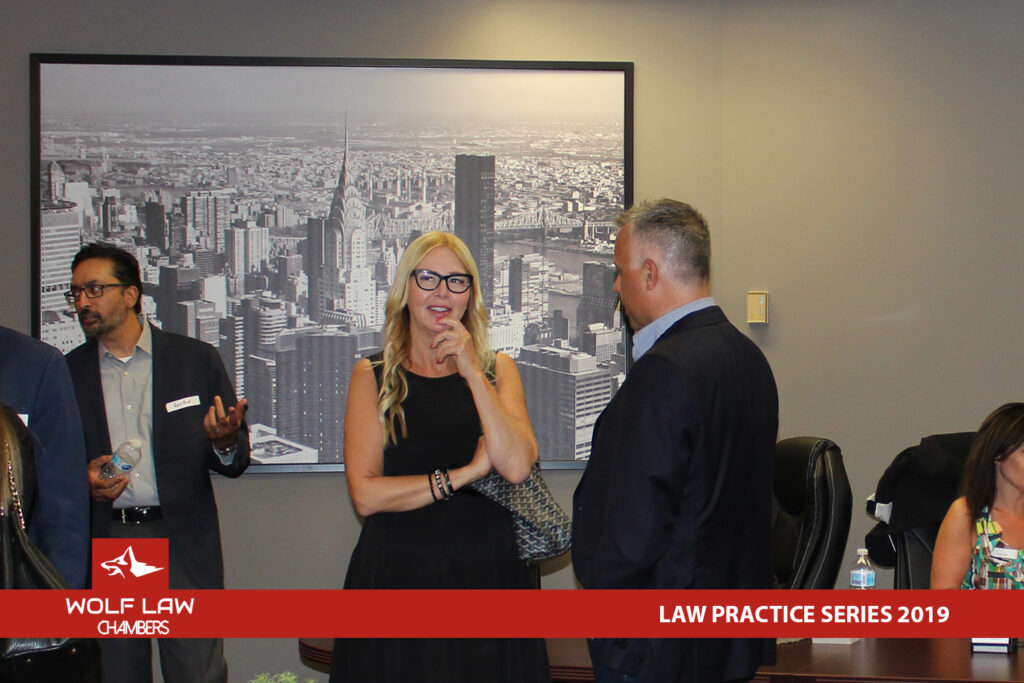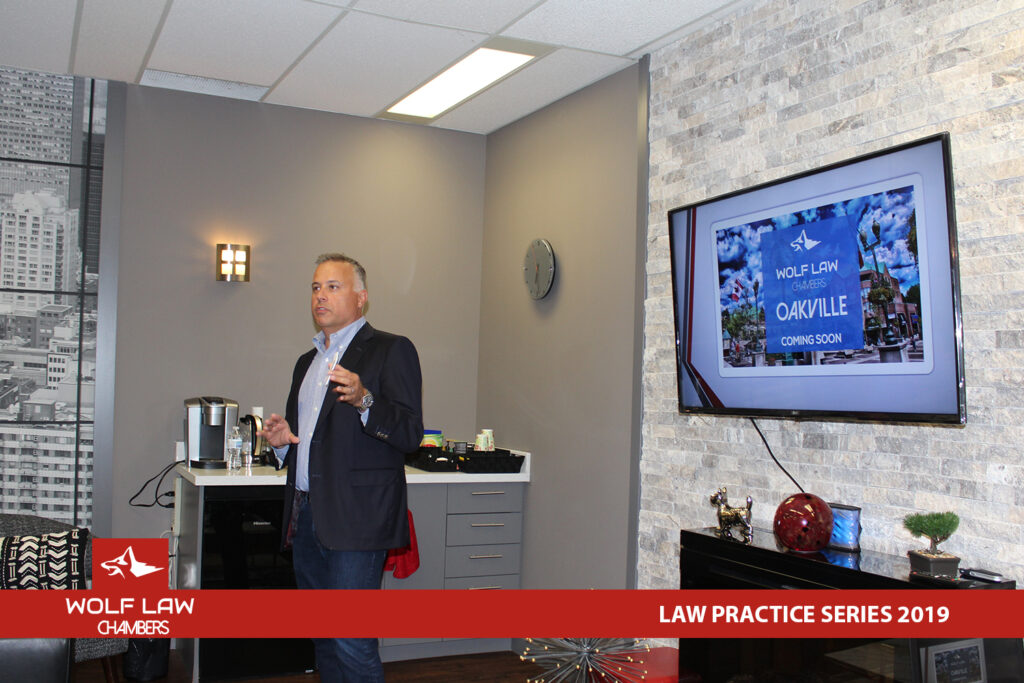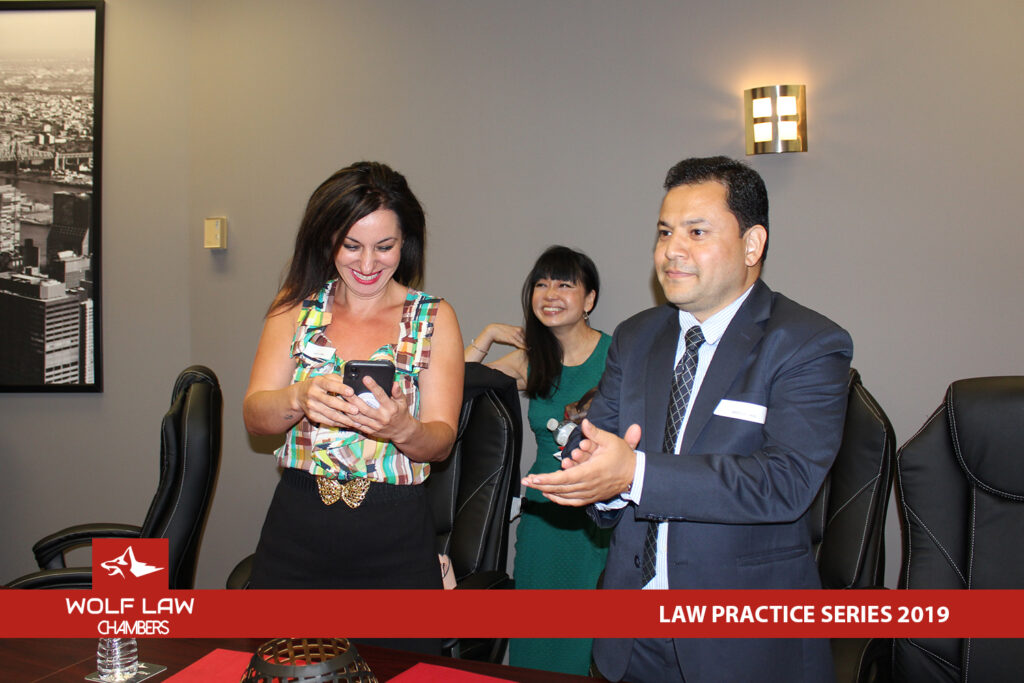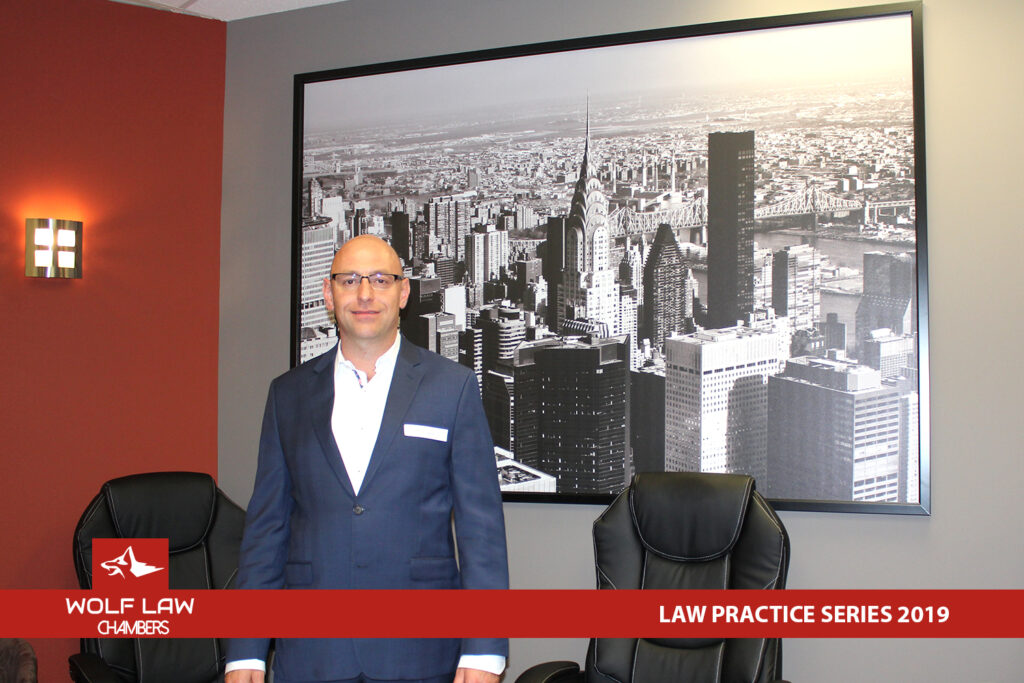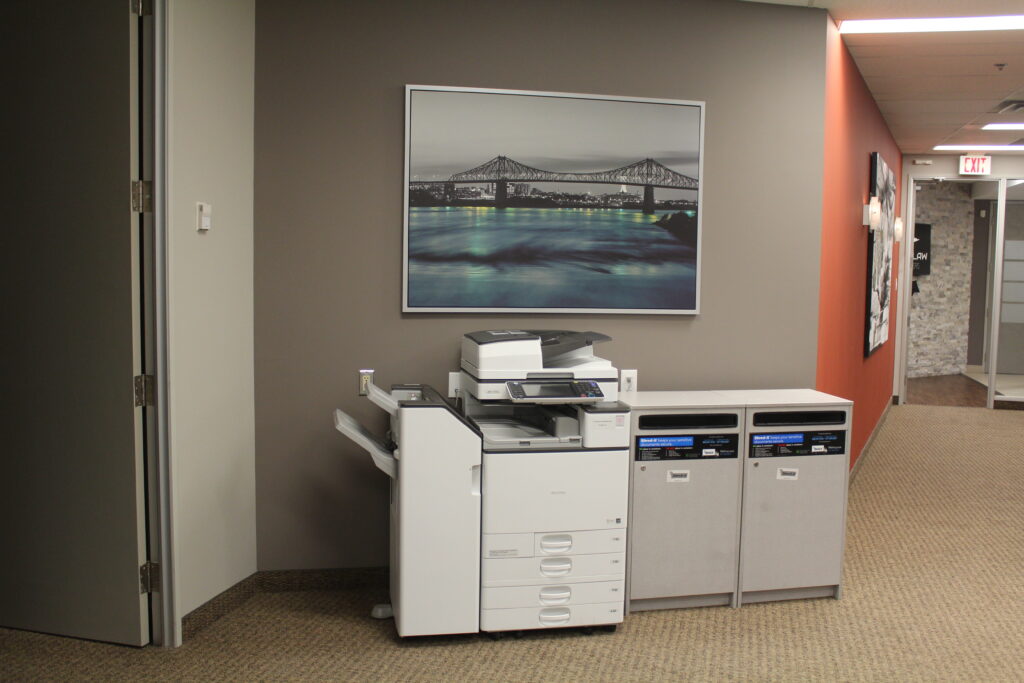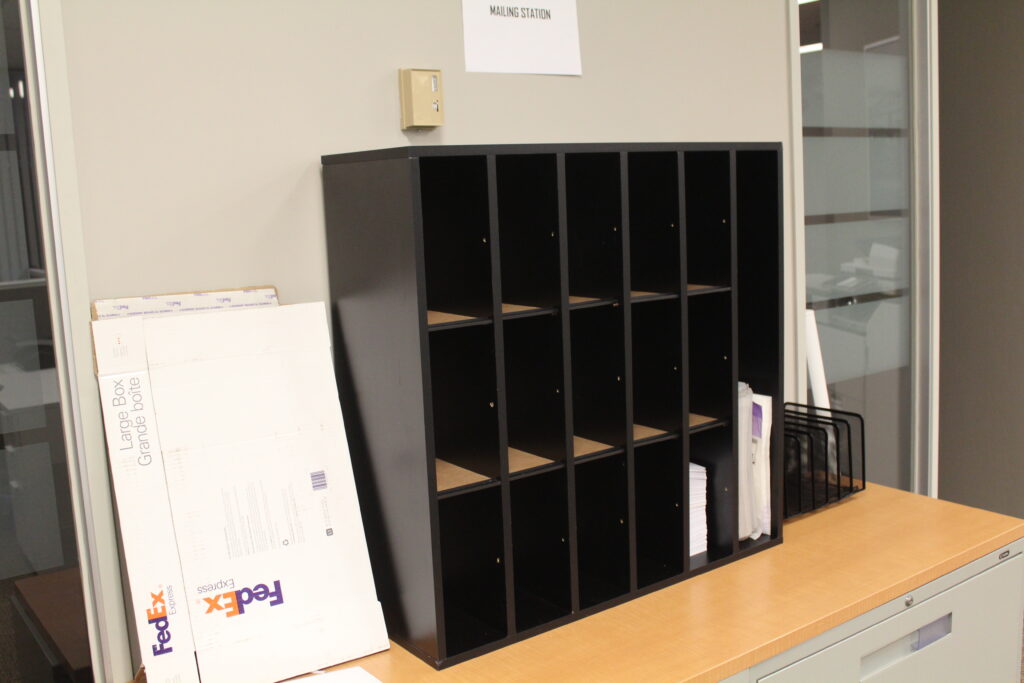LAWYERS
Cyber Security with Humzah Khaial
Cyber Security has been the most requested seminar after How to Survive an Audit (which took place in the spring of 2019). Humzah Khaial kindly gave a seminar on the tactics used by hackers and preventative measures against their attacks to the group gathered at our Oakville location on December 5, 2019.
Even though it can be a scary topic, it is important to educate ourselves not only about ways to prevent attacks but also how hackers try to infiltrate our systems. If we know their methods, it’s easier to recognize their tactics.
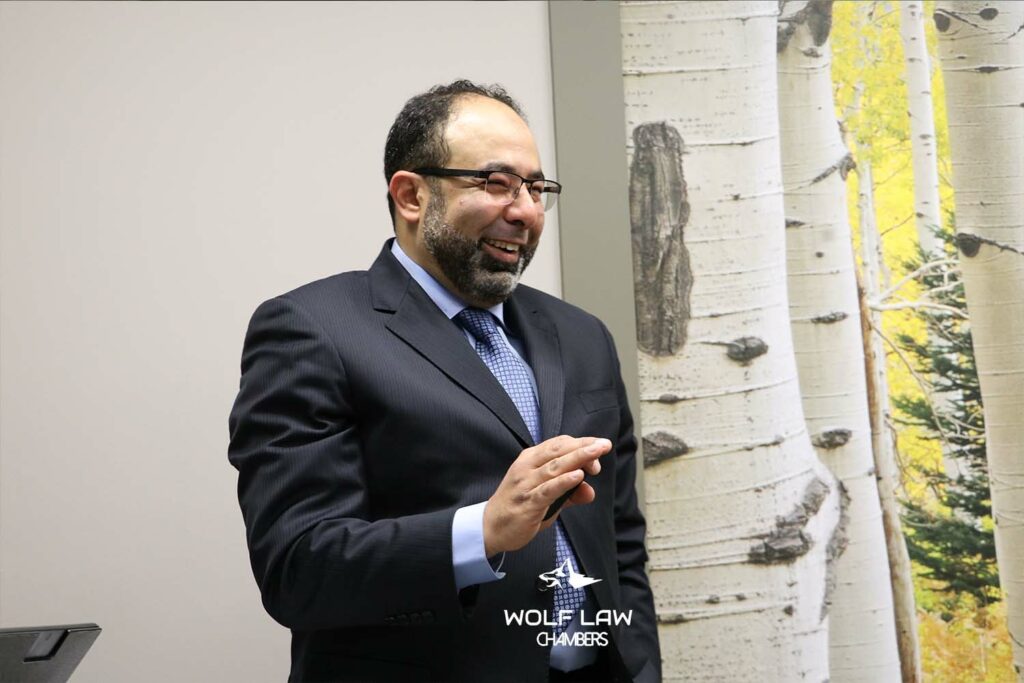
One of the main targets for hackers is small businesses because they’re lucrative. They have money and sensitive information, but they’re small, so they don’t have a dedicated security department, making them easier to hack into.
What to look for
Attachments in emails can look legitimate. But if after clicking on the attachment, it asks you to change something to your system, don’t. If you do, it gives access to the hacker.
How do you know the email is fake? Hover over the “From” address. Microsoft Office and Outlook 365 now give you the full address when you hover. This is to help you identify senders. If you don’t recognize the sender, don’t click.
Another technique hackers use is grammar and spelling mistakes. They want to filter out anyone who is paying attention. They want victims who aren’t paying attention because those people may not remember what exactly they clicked on or allowed onto their computer.

If the email contains an image of text instead of just plain text, this could be hackers trying to get around your detection software. Software can read text easily, but it cannot read images.
Prevention
The best way is a combination defence. Use as many methods as possible to foil hackers.
When on a public network, use a VPN, a Virtual Private Network. It acts as a tunnel between your device and the public network, preventing any would-be hackers from easily accessing your device and any passwords you may enter while on that public network.
Constantly back up your work. This will protect your information no matter what happens.
Don’t use the same password for everything and use a combination of symbols, letters and numbers. Try not to put passwords on sticky notes. They can get lost easily.
Use two-factor authentication. It’s a password and a code sent to your phone, extra security to verify it is you who is accessing the account.
Update all operating systems on a regular basis.
Employees are your first line of defence. It’s important to train them in security awareness and prevention.
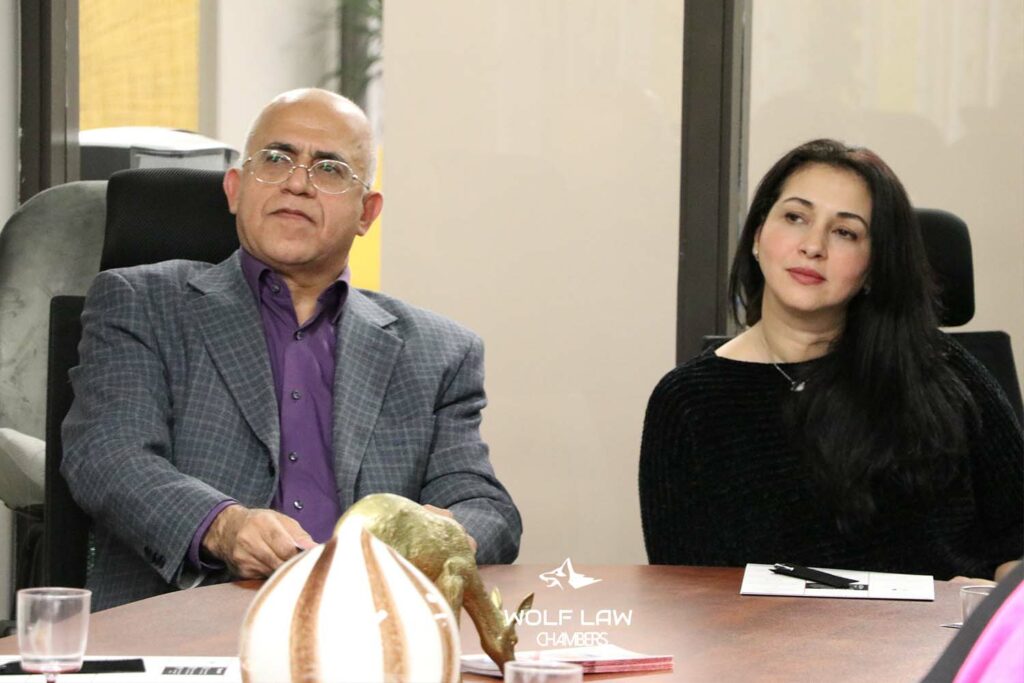
Risk Management
Going forward, we need to: prevent, protect, educate. It’s a continuous and changing process. The technological landscape is constantly changing and we need to keep up to date with it.
As the head of your business, you set the tone for your organization. Preventive, protective and educational measures starts at the top. It starts with you.
At Wolf Law Chambers we strive to host seminars that are relevant to the challenges legal practitioners are facing today. Let us know if there is a topic or challenge you want to learn more about.
Best Interests of the Child: An Intersectionality Between Family and Immigration Law
Article 3.1 of the United Nations Human Rights (UNHR) Convention on the Rights of the Child (CRC) states the following:
In all actions concerning children, whether undertaken by public or private social welfare institutions, courts of law, administrative authorities or legislative bodies, the best interests of the child shall be a primary consideration [1].
The Convention on the Rights of the Child is the most widely ratified treaty in human history with 194 countries abiding by it [2]. It is internationally observed and accepted, while it’s application and practice is a topic for another day. In understanding who is protected under the CRC, we must define what it means to be a child.

According to the United Nations a child is,
…every human being below the age of eighteen years unless under the law applicable to the child, majority is attained earlier [1].
Now, it is quite important to asses the relevance of these international statutes in relation to Human Rights within Canada. To put into perspective the importance of human rights in Canada, we must understand that human rights are protected federally and provincially. The human rights laws in Canada stem from the Universal Declaration of Human Rights (UDHR). In fact, Canadian lawyer and scholar, John Humphrey, played an integral role in the drafting of the UDHR in 1948 as well [3]. Globally, many countries have applied the declaration and its contents to bolster their own national legislations and to act in accordance with the statutes outlined within international human rights laws. In Canada, human rights are entrenched in the Constitution of this very nation, most notably in the Canadian Charter of Rights and Freedoms but they have an overlapping relevance in other areas of law as well. Family and immigration law within Canada places great importance on the best interests of the child, drawing from the Convention on the Rights of the Child. This principal governs decisions and judgements within family and immigration matters, that of which involve children [4]. It is truly a point of intersection across both fields of law and legislation.
The Canadian Bar Association brilliantly outlines the best interests of the child and the three fold concept that entails it.

They use the following general commentary from the Convention on the Rights of the Child to elaborate on their viewpoints about the best interests of the child:
A substantive right – a primary consideration in actions concerning the child due to the child’s dependency, maturity, legal status and often “voicelessness”;
An interpretive principle – if a legal provision is open to more than one interpretation, the interpretation which most effectively serves the child’s best interests should be chosen;
A rule of procedure – legal representation, timely decisions, reasons for how a decision was reached, how factors were weighed, and how the child’s views were considered. [4]

In other words, children have a legal entitlement that ensures those decisions which concern them are carried out with their best interests as a primary consideration. Next, for legislation that is open to interpretation, interpretations serving the best interest of the child should be chosen [4]. The final component involves procedural considerations for the best interests of the child. Whether it is substantively or procedurally, the best interests of the child are to be weighed and considered first and foremost. With this three-fold concept underlying the concepts and legislation set forth by the CRC, let’s examine how it has played an effective role in Canadian law.
In determining child access and custody in the province of Saskatchewan, section 8 of the Children’s Law Act outlines the necessary conditions to be met when making a decision about ordering custody of a child. Subsequently, they note considerations that are to be weighed in granting custody of the child as well. These include, but are not limited to, the capacity of the person seeking custody of the child, the child’s wishes, the quality of the relationship between the person seeking custody and the child themselves, the physiological, emotional, psychological, social, and economic needs of the child [5].
Additionally, section 24 of the Children’s Law Reform Act of Ontario determines the merits for application of custody or access for a child [6]. This statute places immense importance on the best interests of the child, with special consideration of the child’s needs and circumstances. Some of these needs and circumstances include the plan proposed by the person(s) applying for access of custody of the child, the child’s views and preferences, the stability of the family unit in which the child will potentially settle, to name a few [6]. The Revised Statutes of Ontario also outline the procedural practices in place by the court in issuing orders for the custody and access of a child [7].
Federally, the Divorce Act, examines the best interests of the child in carrying out orders for custody of a child [8].
Under section 16, subsection 8, it states,
In making an order under this section, the court shall take into consideration only the best interests of the child of the marriage as determined by reference to the condition, means, needs and other circumstances of the child [8].

It is quite apparent that federally and provincially the underlying principles governing child custody and access in family law clearly place a high degree of significance on the best interests of the child. The priority placed upon the needs and the circumstances of children is not just limited to the area of family law. It also constitutes the legislation surrounding immigration in Canada involving children. In exploring the application of the best interests of the child within Canadian immigration law, let’s take a look at the Immigration and Refugee Protection Act. Pursuant to the act, those normally not able to seek permanent residency in Canada, are able to apply under humanitarian and compassionate grounds in special circumstances [9]. The humanitarian and compassionate grounds assessment weighs the best interests of the child highly and its jurisdiction is within Canada and overseas [9]. Generally, the child’s physical, emotional, social, and cultural welfare are factored in when assessing a humanitarian and compassionate grounds application [9]. The factors considered include, the level of dependency between the child and the H&C applicant, the child’s link to the country in relation to which the application is considered, the impact of returning to their home country, the medical needs of the child, the impact on the child’s education and growth, etc. [9]

Immigration can involve the detainment and release of individuals depending on the context of their specific case.
Under Division 6, section 60 of the Immigration and Refugee Protection Act, states the following:
For the purposes of this Division, it is affirmed as a principle that a minor child shall be detained only as a measure of last resort, taking into account the other applicable grounds and criteria including the best interests of the child [10].
The Immigration Appeal Division does not overlook the importance that is to be placed upon the safety and best interests of the child. It is affirmatively understood from this statute that detaining a minor is the absolute last resort and does not serve in the best interest of the child [10].
Moreover, the right to appeal immigration decisions under the Immigration Appeal Division has procedural laws in place that administer how the government will proceed in detention and release of immigrants/refugees [10].
Section 68, subsection 1, states the following in regard to a removal order being stayed:
To stay a removal order, the Immigration Appeal Division must be satisfied, taking into account the best interests of a child directly affected by the decision, that sufficient humanitarian and compassionate considerations warrant special relief in light of all the circumstances of the case [10].
In the case of a removal order being stayed, the best interest of the child is again given the utmost priority if a child is directly involved. The statute aims to heavily consider humanitarian and compassionate grounds when ordering a stay for a child [10]. This leads one to believe that Immigration Canada carefully formulates a decision oriented in the best interests of the child.

A famous Canadian immigration case based upon H&C grounds is that of Baker v. Canada. An illegal immigrant in Canada for 11 years at the time, on the verge of being deported, filed an application for permanent residency [11]. Her application was rejected and when she filed with the Federal Court, they deemed that it was not necessary to evaluate her application in light of the best interests of her children. On appeal, the Supreme Court of Canada reversed this decision. They held that the human rights of Baker’s children should be considered and that decision makers of this case should abide by the values in international human rights law, specifically the Convention on the Rights of the Child [11]. Overall, it was established that an immigration decision made on H&C grounds would be arbitrary if an analysis of the best interests of the child was not implemented [11].
Closing thoughts
Stemming from international human rights law, the best interest of the child is a principle vested in Canadian family and immigration law involving children. It is undeniably an overlap between the two areas of law and the general guidelines are quite the same. In all actions concerning children, the primary consideration is the best interest of the child. In Canada, both federally and provincially, substantive and procedural law illustrate how the best interest of the child is a fundamental standard in decision making for family and immigration matters regarding children.
[1] Convention on the Rights of the Child, 2 November 1989, UNTS, Part I, Article 1(3) (entered into force 2 September 1990)[2] Human Rights Watch, “25th Anniversary of the Convention on the Rights of the Child” (17 November 2014), online (blog): Human Rights Watch <https://www.hrw.org/news/2014/11/17/25th-anniversary-convention-rights-child>
[3] Canada, Canadian human rights commission, Human Rights in Canada, < https://www.chrc-ccdp.gc.ca/eng/content/human-rights-in-canada> accessed 12 September 2019. [4] The Canadian Bar Association, BEST INTERESTS OF THE CHILD, http://www.cba.org/Publications-Resources/Practice-Tools/Child-Rights-Toolkit/theChild/Best-Interests-of-the-Child accessed 12 September 2019. [5] s. 8, Children’s Law Act, 1997, S.S. 1997, c. C-8.2 [6] s. 24, Children’s Law Reform Act, S.S. 1990, C-2 [7] s. 28, Children’s Law Reform Act, S.S. 1990, C-1 [8] Divorce Act, R.S.C., 1985, c. 3 (2nd Supp.), ss. 16(8), 17 [9] S.C. 2001, c. 27 – ss. 25(1), 25.1, 28(2)(c) [10] S.C. 2001, s. 60, 67(1)(c), 68(1) [11] [1999] 2 S.C.R. 817Reinventing the legal framework
Dezso Farkas
The significance of a man’s prestige is a collective reflection of all his attributes. Dezso Farkas is a man of many attributes. Apart from being a law practitioner and an entrepreneur who helps start-ups, Dezso is responsible for the conception of Wolf Law Chambers. The chambers, described as a multi-disciplinary law practice, is an innovative approach to providing a workplace where legal professionals can seek support and resources, while maintaining their status as a singular entity.
Educational Background
Dezso graduated with a BA Honours degree from York University and then went on to earn his Master of Laws (LLM) degree (specializing in Corporate Governance) and a Juris Doctor (JD) degree, both from Osgoode Hall Law School, York University. Soon after he was called to the Bar and currently, he is licensed to practice as a Barrister & Solicitor in the Province of Ontario.
Apart from periodically visiting the courthouse, Dezso made time to publish several articles in the prestigious Delaware Journal of Corporate Law, Transnational Legal Theory Journal and the London Review of International Law. On a certain occasion Dezso also served with the Institute for Global Law and Policy at Harvard Law with his expertise on the legal side.
Professional Ventures
The scope of Dezso’s abilities is not just limited to law. On top of being a real-estate entrepreneur with considerable experience in the field, in the past Dezso has also acted as a director of the Reliant Gold Corp., a publicly traded junior mineral resources company.

Farkas Law “Business Lawyers”, the independent law firm chaired by Dezso Farkas, caters to the needs of small and medium-sized business clients. The self-description of the firm is stated as a body of “Business Lawyer” with an aim to provide customized legal services, guidance and trusted advice for business ventures of all kinds. Currently the clientele of Farkas Law includes start-ups, commercial landlords, real-estate developers, manufacturing companies, non-profit organisations and small business owners. The firm acts as an external “in-house” corporate counsel to save their valuable resources and focusing them towards successful outcomes.
Dezso’s substantial history of merit is a result of his personal ideology which can be better expressed by himself:
I believe in continuous professional growth and I am committed to gaining new knowledge and experience to better serve the needs of my clients.
Dezso Farkas
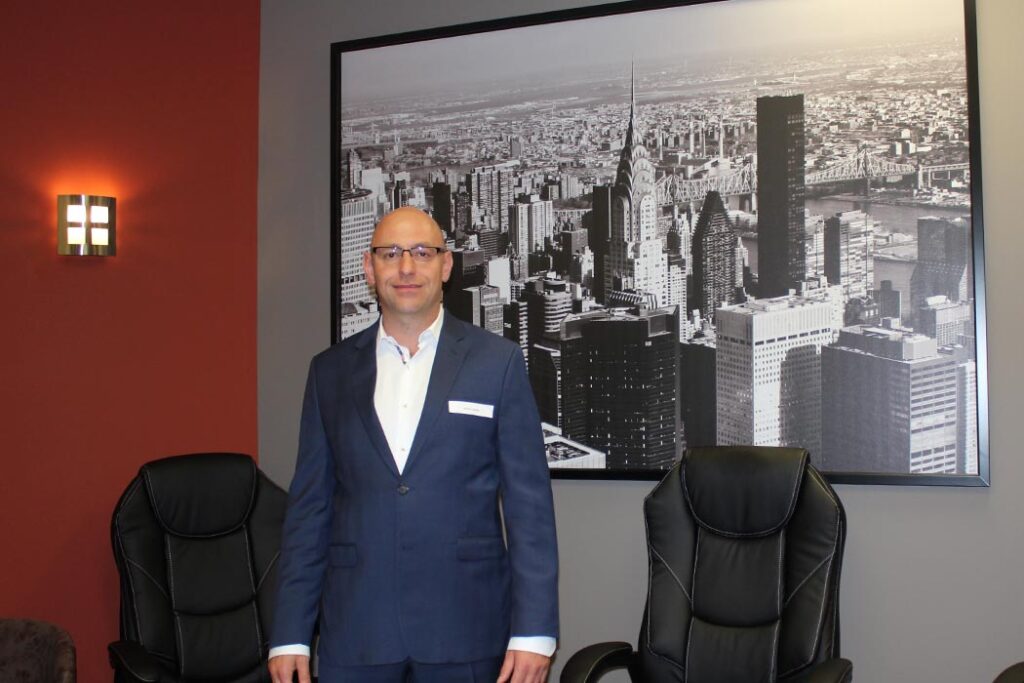
Vision
Ideally lawyers are intended to be a means of resolving problems for their clients. Sadly, not all lawyers are attuned to the needs of their clients. For Dezso Farkas, the motivation to become a lawyer came from his own unsavory past experience. As a young entrepreneur, Deszo encountered some obstacles and to resolve them he obviously pursued legal assistance; unfortunately, he got saddled with a ‘disengaged’ lawyer. At this point Dezso realized how detached lawyers are to the ideology of young entrepreneurs. Back then, if he had been a lawyer, he definitely could have handled his case more efficiently, he realized that going into law practice could be a real opportunity for him to help people.
Young entrepreneurs have no idea of the trouble they might get into when they are starting out. Its not possible for them to know everything about the line of commerce they are about to enter on their own. The consequences of their natural ignorance can sometimes be dire. Consequently, it is more complicated to undo a problematic situation than to avoid it in the first place.
Nevertheless, if an entrepreneur seeks the right advice from the very beginning, there’s no reason for them to get into trouble. According to Dezso, the biggest complaint he hears from his clients is that other lawyers don’t understand their clients’ businesses. Dezso on the other hand wants to understand his clients’ businesses and perspectives. He has a desire to leave people better than when they first came to him seeking a solution to their problems. In his own words, Dezso wants to be ‘Their Trusted Advisor’.
Wolf Law Chambers

Not all lawyers have the innate ability and the right personality to make it as sole practitioners. Lawyers who possess such qualities cannot work under others for long and can only thrive when they work for themselves. However, when these lawyers enter the domain of sole practice, they face a multitude of unique challenges they are not ready for. Support is non-existent as a result of their isolation and limited networking opportunities. The Law Society provides certain resources, to help solo firms stay compliant, but they have no avenue of providing any personalized advice in light of the ever-evolving business landscape to individual lawyers. In terms of modern-day workspace flexibility, the options for a lawyer on his own are very limited. Sometimes it becomes practically impossible for them to go out and search for law-based developmental resources to further their practice.
To Dezso the idea behind the creation of Wolf Law Chambers came as a solution to all the problems discussed above, which are being faced by lawyers. The services available at Wolf Law Chambers are uniquely targeted for law professionals, in order to allow them to grow personally in their sphere. The networking opportunities at Wolf Law Chambers are incredibly advantageous for sole practitioners. All the available resources, connections and events, allows lawyers to seek counsel from others in their profession, without any prejudice and with the purpose of benefiting each other. All of this is being carried out by lawyers at Wolf Law Chambers, while retaining their status as owners of their own law firms.
All lawyers should seek every opportunity they can to enhance their practice.
Dezso Farkas
Future
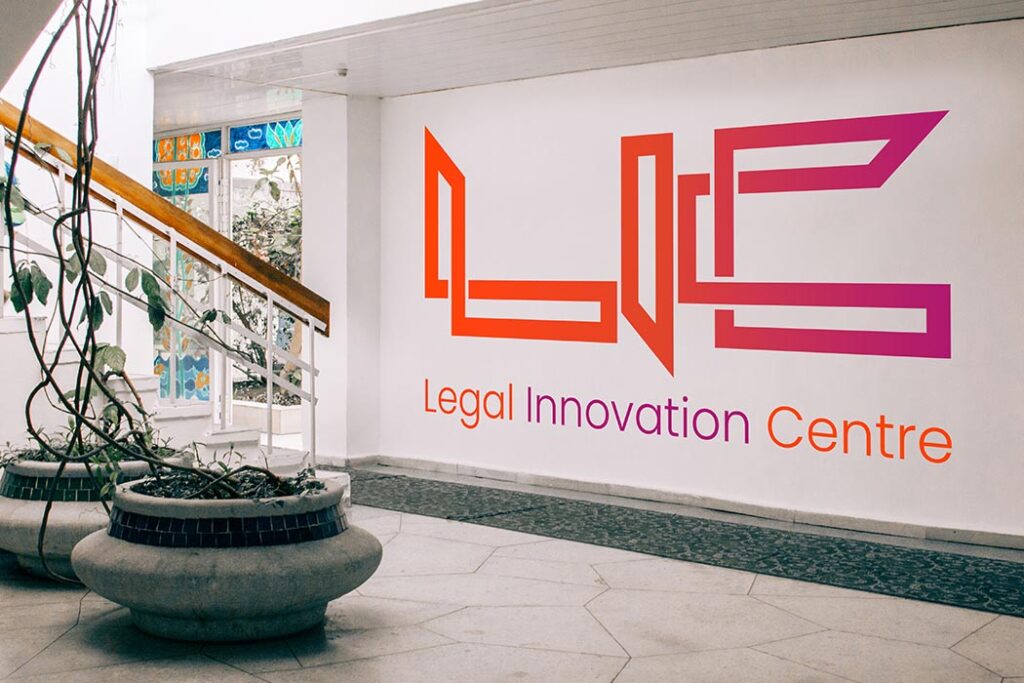
For Dezso Farkas, the future is just as promising as his present. He’s already planning to launch his upcoming project; the Legal Innovation Centre. Legal Innovation Centre will act as a ‘technology incubator’ to mentor start-ups in areas of legal research and development. According to Dezso, currently technology start-ups in the GTA West area are facing many challenges. There is a definite need for a facility like Legal Innovation Centre. The center will alleviate issues using their 3-step assistance plan; finding funding programs, providing a collaborative space and introducing start-ups to an already established network of industry experts. Legal Innovation Centre will focus resources on technological innovations which aim to shape the legal industry.
Are You Always Running Out of Time?
Are the current standards you have set in place the most efficient and viable in achieving your goals? Are you finding the right balance between your work and personal lives? Are you always pushing back deadlines and rescheduling matters? These are some of the questions you must ask yourself when assessing your legal practice. For lawyers, time is of the essence, no pun intended. They must prioritize their schedules in order to complete tasks on their daily agenda. There is always a constant influx of tasks and prioritization means everything when your most important assignment could be the next one you receive. Having the right skillset, tools, balance, flexibility, and procedures in place can simplify even the most complex matters allow lawyers to execute their plans proficiently. Such practices enable a firm to become more productive and this increased productivity is inevitably going to result in increased profits.
Let’s examine a billing trend report to determine how much billable time lawyers are actually getting out of their workday. Lawyers are working long hours to meet productivity goals but are only billing for 29% of their workday on average [1]. There is definitely a discrepancy in this figure and how occupied a typical lawyer’s schedule is. That means legal professionals are spending time carrying out tasks that do not equate to billable time. These tasks include, but are not limited to, administrative functions that are required in running your practice. Law school teaches lawyers how to carry out legal work and put their valuable legal expertise to practice. It is this knowledge and capability that allows lawyers to bill their clientele and earn an honest living. Yet, all law firms include tasks which need to be performed in order for a practice to remain functional but are not billable.

A simple business principle that can be implemented is outsourcing these tasks and leaving more time for yourself to work on assignments which can generate billable time. Bookkeeping and office administrative tasks can take up large portions of a workday but by outsourcing them to staff and paying for a particular service, more time is left for lawyers to focus on the legal matters specific to their line of work.
In realizing the proper techniques that need to be applied for running a more efficient legal practice, a quote from Mark Twain came up numerous times.
If you eat a frog first thing in the morning, the rest of your day will be wonderful.
Mark Twain [2]
and
If you have to eat a frog, don’t look at it for too long.
Mark Twain [2]

It is important to note that certain tasks can be daunting, and lawyers may push them back because they may take up most of their day. According to Twain, it is these tasks that could hold one back. Complete your most difficult assignment first thing in the morning, and suddenly, the other tasks become minute and less challenging. In doing so, you are able to prioritize your assignments, and create to-do lists for yourself in collaboration with your calendar [3].

Next, eliminating distractions will give you a sense of clarity in your work/practice. It is healthy to take breaks throughout your day and refresh but being unproductive is unjustifiable. Another healthy practice is taking care of your emotional and physical health. Being mentally and physically fit will contribute to your success just as much as your skillset and business intelligence will [4]. Being able to attract clients is not the sole determinate of success for a legal practice. It is equally important to be able to work on matters for those clients on a time efficient basis. If that includes taking a break, so be it. One should be open to the idea of stepping away from their work. Research shows that our brains are capable of solving problems while we are not actively working on them [5]. Hence, stepping away from your practice may, in fact, prove to be more beneficial than harmful.
Implementing technology may also prove to be an effective practice tool in time management. Using the most adept practice management software, communication tools, and digital services can lighten the burden on you and allow you to allocate time more freely. That simple advantage separates those attorneys who surrender focus on one aspect of their work and those who are all over the place.
A workspace committed to providing lawyers with the excellent communication tools and services to improve efficiency, is that of Wolf Law Chambers. Located in the heart of Mississauga, the chambers aids lawyers through the administrative aspects of their practice. This helps facilitate growth and expansion for the lawyers in their area of practice. Come in and see for yourself how Wolf Law Chambers is innovating time management in the practice of law. Visit us as 90 Matheson Blvd. West, Suite 101 and feel free to join us for all our upcoming events and workshops.

-Narvir Goindi
Networking Event – Legal Outsourcing vs. Hiring New Talent
Thank you to our fellow sole practitioners, the marvellous Peter Carayiannis from Conduit Law, and most welcomed guests for joining us on Thursday, August 15th, 2019 at Wolf Law Chambers. The topic of discussion for our event was the practicality that lies in outsourcing legal work in comparison to hiring new talent. Initially, sole practitioner, Dezso Farkas, of Farkas Legal Professional Corporation, spoke on the misconceptions in the legal field about outsourcing tasks to staff or legal clerks.
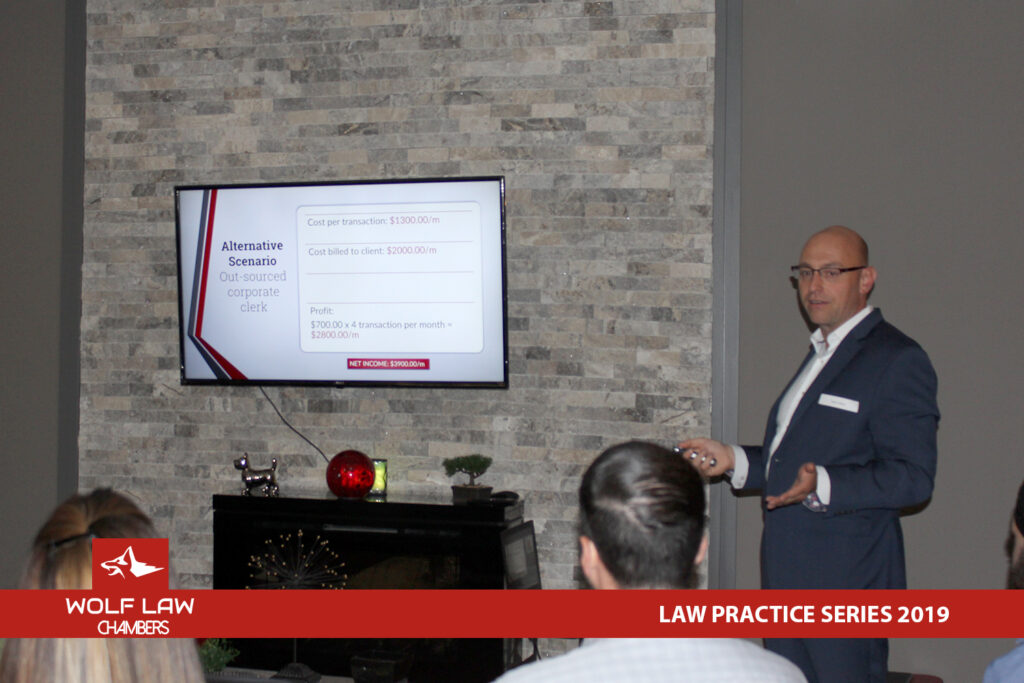
He explained how sole practitioners have a false perception that entails them carrying out every task that is part of the profession. Doing so, takes up a significant portion of their day and they are left with little to no time for billing clients. Mr. Farkas used accurate figures and analysis to depict how hours spent on practice management can be outsourced to staff and/or legal clerks to spend more time on actual legal work that can be billed. This leaves room to yield higher returns immediately, and is significantly compounded over longer durations of time. Legal outsourcing may seem like a discouraging practice as one has to shell money out of their pocket at first, but the time left to actually work on files and bill clients summons more profits for legal professionals.
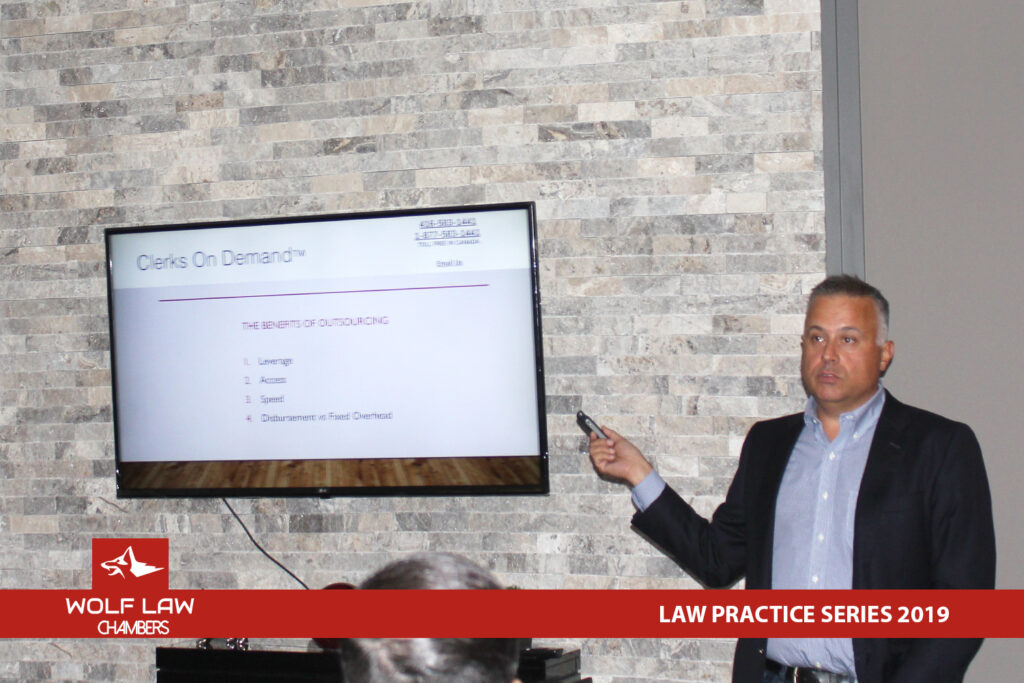
Peter Carayiannis from Conduit Law and Clerks on Demand outlined the many advantages legal outsourcing can have on one’s legal practice. He explained the differences between hiring new talent and outsourcing tasks to a company like Clerks on Demand. Essentially, hiring new talent thoroughly involves a recruitment process, training that has to be given, dealing with employee needs, and the constant thought of an employee leaving, leading to the whole process occurring again. Legal outsourcing, on the contrary, encompasses the passing of particular tasks to a professional and certified legal clerk, who is capable/experienced enough to complete assignments on their own. They can even be hired for a particular task or a specific period of time, allowing sole practitioners to leverage their time accordingly. Lawyers can then apply themselves to other facets of their practice, which in turn, allows for a yield of more returns. Peter brought up an interesting point during his presentation. He insisted that the audience understand the practicality behind outsourcing certain tasks of their legal practice. If a lawyer is not serving their client’s needs by performing a certain task, it should be outsourced to a legal clerk who can take care of it, while the lawyer works on more important matters, that serve the client’s legal needs directly.
Many of the sole practitioners present at the event saw the immediate benefits from outsourcing various areas of their practice to staff or legal clerks, and by doing so, being able to better focus and serve client needs. Some lawyers even noted the benefit in taking on more tasks than they would normally be able to handle by simply hiring clerks. Peter’s company, Clerks on Demand, allows lawyers to do exactly that. They can hire clerks at any time to assign tasks that they may not want to carry out and/or have the resources/time to complete. They would still be able to supervise all operations without having to indulge completely. With that said, any aspect of legal practice that does not serve the purpose of going to law school and receiving a legal education, can be contracted out, allowing lawyers to leverage their time accordingly.
A workspace designed to provide sole practitioners many opportunities to leverage their time efficiently is Wolf Law Chambers. The Wolf Law Chambers team incorporates innovative technological practices in their office to allow for rapid communication between lawyers, staff, and clientele. They also offer many services to sole practitioners deciding to join them, such as easily accessible office coordinators, marketing specialists, and process servers. These individuals are staffed to allow lawyers within the chamber to focus on what really matters: serving their client’s needs and executing the legal work that they specialize in.
We loved the turnout for the event and hope to continue seeing both familiar and new faces for the future. We have a workshop coming up again on Tuesday, August 27th, 2019 from 6-9 P.M. with guest speaker, Humza Adam of HFactor Solutions. Humza will be providing business development and marketing strategies for both lawyers and paralegals. We hope to see you soon!

Come in and see the exceptional services Wolf Law Chambers has to offer for you and your clientele. Currently, there is a Wolf Law Chambers location in the heart of Mississauga, and we are proud to announce the opening of another location at 227 Lakeshore Road East, Suite 408, in downtown Oakville. Wolf Law Chambers is dedicated to being easily dependable and providing sole practitioners with all the resources they need to succeed in the legal profession. Please feel free to book a tour and join us in building a community of sole practitioners striving to set new standards.
The Importance of Obtaining and Reviewing a Status Certificate with a Lawyer
It is not information itself but how we use it that defines our prudence. An overload of information will lead to poor decisions, despite any lucky benefits, since too much information is equivalent to no information, and any decision based on no information cannot be prudent but only speculative. The same can be felt by the lay potential buyer of a condominium unit who obtains a Status Certificate for determining whether to buy a unit for residence or for investment. Reviewing a Status Certificate may seem like information overload to someone who has not been trained for such a task. Thus, in such circumstances, the best approach may be to consult a lawyer who is knowledgeable of the nature and implications of the Status Certificate’s contents, for they would know how to use the information provided in the document.
Status Certificate
A Status Certificate is a document which provides potential buyers with the current legal and financial “status” of a condominium unit along with some information about the condominium corporation, which is made up of owners of the condominium. It a snapshot of the corporation and unit’s position at a given time.
A document analogous to the Status Certificate is the Annual Report of a public corporation, which contains financial statements, ongoing legal matters, and other sets of information which give potential investors a clearer picture of the business of concern. Potential investors, who are looking to be shareholders or creditors, would look to this Annual Report to gather the insights they need to make a smart investment decision. Unfortunately, not everyone knows what to look for when analyzing the Annual Report; and not everyone knows what to do despite having the necessary information in front of them.
Similar can be said to the potential buyer of a condominium unit. Upon request to the condominium corporation which owns the unit of concern, the corporation will give the requester a Status Certificate, with a specified date, containing the information listed under section 76 of the Condominium Act. The main elements of the document can be stated as follows:
- The Scope of the Unit;
- The Budget and Financial Status;
- Any Ongoing Legal Proceedings;
- Rules, Regulations, and Restrictions; and
- Insurance Requirements for owners.
Scope of the Unit
It is important for every potential buyer to consider what the unit of concern entails. Does it come with a parking unit; or perhaps a locker? The Status Certificate will confirm the legal description of the unit, including lockers or parking units. This can be important for consideration, as in some cases parking units or locker units are not owned but are instead used by the seller. Only a careful review of the Status Certificate and accompanying documents will confirm just what the seller owns and what exclusive rights are transferable to the buyer. Once confirmation is made, the potential buyer can be one step closer to being a prudent buyer.

Budget & Financial Status
The Status Certificate provides the potential buyer with the common expenses of the respective condominium unit. The document also provides any increases to the common expenses for the unit that the board has declared since the current fiscal year’s date of the budget of the corporation, along with reasons for such change, pursuant to section 76(1)(b) of the Condominium Corporation.
Moreover, while common expenses of the past are important for consideration, reviewing the current budget will also shed some light into the budgeted expenses for the condominium corporation as a whole, which provides valuable insight to the potential buyer regarding the corporation’s financial priorities for the future. It might also provide an intimation to how well the condominium corporation manages the business and its units.

In addition to the common expenses and budget, the reserve funds can provide some interesting information. In essence, it is a special account from a financial institution (i.e. bank) which is separate from the condominium’s operating fund. This special account would be used for major repairs and replacements within the condominium units. It is analogous to an emergency fund. Reviewing the reserve fund can be important for the potential buyer because, supposing the potential buyer one day becomes the new owner of the unit of concern, the answer to whether the condominium corporation can quickly repair or renovate as required may vary depending on the amount of money kept in the reserve fund. Without proper consideration of the implications of the particular amount of monies held in the reserve fund, it can be quite difficult to make a prudent purchase of the condominium, for the reserve fund analysis can be crucial when determining whether the purchase of a condominium unit was worth its price.
Legal Proceedings
The main questions regarding legal claims is quite simple: is the condominium corporation involved in any legal proceedings before the court, arbitrator, or administrative tribunal? Are there any judgments outstanding? What about liens or special assessments? Answering these questions can reveal any red flags that the potential buyer should be aware of before signing the purchase agreement. All legal questions should be pointed to answer to the ultimate question of whether the purchase of a particular condominium would be prudent. This is best achieved by consulting a lawyer.
Rules, Regulations and Restrictions
The question of whether the corporation has faced or is facing material legal problems can be followed by the question of whether there are any laws that unit owners must follow during their time of ownership. This would be very important to know before making any purchase, since such rules and regulations may constrict the intended behaviours of future unit owners. For example, a potential buyer could have purchased a condominium unit for the sole purpose of renting out the space to tenants. However, if the rules of the condominium corporation dictate that there shall be no tenants, then the purpose of the purchase is rendered meaningless, though the term against tenancy may be enforced under contract law.
Furthermore, suppose the potential owner has a pet dog. It would be quite important for the potential buyer to know the restrictions on keeping pets within the respective unit, notwithstanding whether such restriction is based on animals, breed, size or something else. Thus, a thorough review of the rules disclosed through the Status Certificate would provide the potential buyer with the information to properly determine whether their intended use for the property of concern would comply.
Insurance Requirements
Needless to say, insurance is important; and a brief review of the condominium declaration can provide clarification to the potential buyer on the insurance coverages that a current owner is required to obtain. Typically, a condominium corporation maintains comprehensive insurance for the building and its common elements. However, unit owners are often required to obtain coverage for their personal property, and for liability relating to incidents within the purchased condominium unit. Discussing these insurance requirements with an insurance agent during the conditional period will allow a prospective buyer to determine whether they will be able to obtain the required coverage and associated costs.
Concluding Remarks
Not everyone knows what to look for when analyzing the Status Certificate; and not everyone knows what to do despite having the necessary information in front of them. It is not enough to obtain and review complicated information alone, just as it is not enough for the lay reader to understand the implications of the information written in an Annual Report or a medical report. Someone reviewing an Annual Report would be prudent in seeing an expert in Accounting, Finance or Law. Someone reviewing a medical report would be prudent in consulting a doctor. Likewise, the potential buyer of a condominium unit would be prudent in reviewing the Status Certificate with an expert in the field of Real Estate Law. Thus, seeking consultation with a lawyer on the Status Certificate can be the best approach in making a well informed prudent purchase of a condominium corporation, whether it be a new home or a new investment.
-Aaron Rajesh
5 ways to effectively market yourself in a legal practice
In today’s market, competition is generally high. How we present ourselves to the world can make a significant impact on the success of our firm or practice. So here are the 5 ways to effectively market yourself in the legal market.
We made sure to keep our list simple and easy to remember:

These are the traditional five senses. It should be the goal of the effective legal firm or practice to reach all five senses of potential clients through various means.
 Vision:
Vision:
It is important for the practitioner, or any business for that matter, to reach the potential client’s line of sight. There are many ways to do this. In today’s market, however, one of the most effective means for catching the eyes of the potential client is by having a clear and simple website which is easy to use and, most importantly, is on the first page of a Google Search. Also, if it is known that a specific group of potential clients watch a particular channel on TV, try to put an advertisement on that channel. If your potential clients are likely to spend more time on YouTube, make a YouTube channel or advertisement.
But don’t just stop after that. A marketing campaign is not just outside the office but inside as well. If a potential client walks into the office, it is important that such office looks good (check out our article on the Perfect Office). Furthermore, it is important that the practitioner looks good! So make sure to dress to impress.

Reaching the client’s line of sight and gaining their attention and interest is very important, for our memory works best from visual stimuli. In other words, we are generally better at remembering or recalling what we have seen attentively rather than what we smell or touch. So make sure to reach the eyes of potential clients and show them your value.
 Hearing:
Hearing:
Human beings are generally good at remembering what they have heard if they are attentive to what they hear. So it is important for any practitioner or firm to be heard in a way that draws attention.
There are many ways to be heard. Today, podcasts are quite popular. It may be beneficial to attend someone’s podcast and speak with clarity and specificity. Another option is to place an advertisement on a radio channel if it is known that potential clients will be listening to that channel.

However, the best and most effective way to be heard is to be a good lawyer or firm. If the work you do is exceptional, it is possible that clients will speak on your behalf by placing a good review. Reputation matters a lot in this field. There is nothing better than a potential client saying, “I hear this lawyer is amazing at what he does.”
 Smell:
Smell:
In contrast, there is nothing worse than a potential client saying, “something smells fishy.” Trust is crucial to a legal practice not only from a legal standpoint but also from a business standpoint. In addition to the metaphorical sense of smell, it may also help to literally smell good.
Olfactory marketing is a relatively underdeveloped field of sensory marketing. However, there is evidence that the scent of a person may have an impact on first impressions. And if first impressions are good, then the following impressions tend to also be good. Thus, to enhance the likelihood of good impressions, make a good first impression by investing in scents which make the office smell good and make the lawyer smell good.
 Taste:
Taste:
Did someone say, “free pizza?”. It is common knowledge that our actions sometimes follow our stomachs. So to be more welcoming to potential clients or current clients, make sure to invest in some refreshments for clients entering the office. Offer them coffee or tea during meetings, give them refreshments, etc. Be hospitable. Sometimes, it could even help to take a potential client to lunch.
 Touch:
Touch:
Be careful with this channel of marketing. There are some clients who are huggers and some who are not. But nothing beats a strong and confident handshake. Since first impressions matter, and a handshake significantly affects first impressions, handshakes do matter.

But handshakes are not only important for first impressions. It can also be important when saying goodbye. Last impressions can sometimes be just as important as the first. So make sure, after speaking to a potential client, to give a good handshake when saying goodbye for the day.
Sensory Marketing (Scrap Notes)
|
(what do customers see?) |
|
|
|
|
|
|
|
|
|
|
|
|
|
THE BENEFITS OF BEING A SOLE PRACTITIONER
In 2013, 77% of Ontario’s law firms were comprised of sole practitioners and the number of new lawyers choosing that route is still consistently increasing. This figure is no coincidence as becoming a sole practitioner definitely encompasses countless benefits to one’s career. Choosing your line of work and narrowing that further into a specialization is truly fulfilling for any professional. Lawyers who practice as sole practitioners are able to effectively explore various practices without seeking permission or approval from others. This flexibility also corroborates opportunities for expansion and innovation. It paves the way for lawyers to constantly keep an eye out for procedures that need improvement and implement new ideas that look to accomplish exactly that. This can make a sole practitioner’s work interesting and engaging, shifting focus away from the pressures that inevitably exist in the profession. In doing so, the results produced by sole practitioners preserve the highest standards for their clientele and practice. It is these results that ensure one’s business is continually growing. Now, let’s explore the top and most important benefits of being a sole practitioner.
Flexible Work Schedules
The 17th Volume of the Robert Half: Demand for Skilled Talent report outlined incentives that workers want the most. On the top of that list was flexibility for work hours, with 88% of employees surveyed citing it as the perk that they most desire. This figure is also indicative of a lack thereof in the respective fields of the participants in the study. For sole practitioners flexibility is apparent as professionals work around their own schedules and allocate work hours based on priorities. The ability to prioritize one’s workload is also extremely beneficial as sole practitioners are able to dedicate time to other fundamental areas of their practice. Such practices include but are definitely not limited to marketing, workshops/conferences to further advance one’s knowledge and skill set, networking events, and/or educational certifications. Doing so requires time and effort, which can be difficult to allocate unless you are dictating your own schedule.
![14 [Converted]-01](https://www.wolflawchambers.ca/wp-content/uploads/2019/07/14-Converted-01-300x300.jpg)
Return on Investment
Sole practitioners work for themselves and reap all the benefits of their efforts. The harder they work, the more rewarding it is. Their salary is not administered under someone’s payroll, so the net gain of a sole practitioner depends on their ability to attract clientele and manage their legal needs effectively. Sole practitioners do not have to manage an immense workload and worry about their residuals staying the same. The more time and effort they invest into their practice, the greater the yield of results.

Opportunities to Experiment
Whether it is implementing new technology, diversifying your line of work, or integrating new ideas for enhancing productivity, sole practitioners can choose to experiment without seeking permission from a higher authority. In the legal field, technology is changing the way traditional law firms have worked. For example, Dezso Farkas, of Farkas Legal Professional Corporation based out of Mississauga has been cited implementing innovative technology to emphasize the importance of efficiency as a sole practitioner. Using technological applications such as Skedda, Slack, and Envoy enable his firms daily practices to run very smoothly. These communication applications allow clients, the lawyer, and staff to engage in ways that are very advanced. Individuals can complete tasks for each other and receive communicate throughout the day without being in the same vicinity. Deanna Hayko, a partner at iN STUDIO in Toronto believes that office spaces more open to the idea of a neighborhood environment are able to allow for increased mentorship and inclusiveness.
A prime example of this environment is a chambers located in the heart of Mississauga. Known as Wolf Law Chambers, this office has become a community of lawyers working independently as sole practitioners. This is a new approach to the traditional firm and allows for inclusivity between lawyers on different matters that may intersect different areas of practice. Lawyers at this chambers are also able to interact and become part of a community of professionals. This stimulates growth and provides sole practitioners with an opportunity to share resources to resolve legal matters.
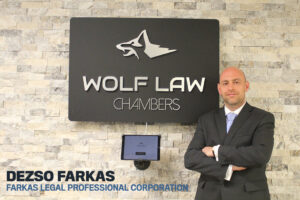
Service
Clients are more informed than ever with the help of the Internet, so it is important for lawyers to dive into niche markets to better serve their clients. By becoming a sole practitioner, lawyers can figure out their passions and dedicate their services accordingly. This flexibility allows lawyers to serve their clients better and in turn, ensure client satisfaction. By being able to devote more time an effort to individual clients, the client always remains the priority for a sole practitioner. Sole practitioners are able to concentrate on each individual matter effectively without the concern of being bombarded with work they do not want to complete, paving the way for excellent client and lawyer relations.
Closing Thoughts
In summary, being a sole practitioner presents a vast amount of benefits for lawyers looking to operate with flexibility, gain high returns on their investments, have complete control of their work, experiment with new ideas to improve their practice, and serve their client base with the utmost sincerity. Sole practitioners are in complete control of everything that follows along with their practice and they are in charge of what they want to do in each and every matter they pursue. They are able to choose their line of work by investigating and streamlining their passions in law. Also, sole practitioners can constantly brainstorm new strategies that will improve their practice and ensure clients remain extremely satisfied with the exceptional service they are able to receive. With that being said, if you are a lawyer or plan on becoming one, I urge you to give becoming a sole practitioner a great deal of thought.
-Narvir Goindi

What makes the perfect office?
The Sole Practitioner’s Perfect Office
Today, we will be shifting our focus from law to psychology. It is no secret that where we work can shape how we work. So it is within the best interest of all sole practitioners to consider where they work. After all, if the environment around us can influence the way we work, would it not be in the best interest to put ourselves within an environment which can influence us or our work in the best possible way? This is precisely why today’s question is on what makes the perfect office for sole practitioners.
Perfection implies the fulfillment of one’s purpose and the maximization of one’s potential. The office, on the other hand, is the place that is meant for people to conduct their business and has the potential for bolstering the conduct of business. When these two definitions are amalgamated, we may better understand the meaning of the perfect office: a workspace designated for conducting business which contributes, as much as an office possibly can, to the maximization of how well business can be conducted.
So how can the quality of business processes be improved by an office? This can be answered by asking ourselves three simple sub-questions:
- Will I enjoy going to this office?
- Will my office boost my productivity?
- Will my office enhance the customer experience?
Enjoyment
Going to work can be quite difficult and exhausting when there is no enjoyment there. The challenges are exasperated further when the person going to work is solely responsible for the current and future position of their business. This is why it can be important that people enjoy what they do. Enjoyment keeps us awake. It makes us want to go to work. One of the factors that contribute to the greater enjoyment is the perfect office.
The perfect office is an office which brings us as much enjoyment as an office possibly can. This can vary depending on the person, but general psychological findings indicate that most people enjoy going to an office with a natural look. Here is an example of an office with a natural look:
These are pictures taken from the office of Wolf Law Chambers. What makes it nice to look at? One of the best explanations for this is called “soft fascination”, which is said to elevate our moods (as well as replenish our capacity for memory and creativity).
This is not to say that every sole practitioner should strive to replicate this exact office. It is to simply show how people generally gravitate towards offices with some natural lighting, plants, and a green scenery. But even if a natural look is not possible, then there is research which suggests that even reminders of nature can play a role in putting us at ease while also making it easier to connect with others. Examples include aquariums, fireplaces, plants, wooden furniture, etc. Feel free to be creative within a natural image.
Productivity
A beautiful office is worth nothing if it hinders or fails to improve productivity. An office must contribute to at least some productivity. This is where choice can play a significant role. The sole practitioners has a choice to organize their office the way they like. Research indicates that this can contribute quite effectively towards the worker’s well-being and productivity.
The technology within the office can also contribute to productivity. The test for this could simply be to observe how quickly someone can complete their tasks when they have a fast and well-structured information technology or information systems. It is almost guaranteed that the person with greater information technology and systems will be more productive than the one who has none, given that they use it properly. If used improperly, productivity may be seriously hindered. This is why even a messy desk can result in greater productivity if it is an organized mess. It is not so much about the tidiness of an office but the organizational systems which make for greater productivity.
Customer Experience
As they always say, customers come first. This is especially true for lawyers. One of the factors which can contribute to the experience of a client is their experience at the lawyer’s office. The natural look of an office can certainly help in improving the image of the lawyer. Another factor, that is not already mentioned in the enjoyment section, is the concept of curved furniture. Research indicators that people generally prefer curved furniture over sharp furniture when all is organized well.
Final Remarks
In the end, what matters most in an office is that it is enjoyable and is conducive to higher productivity and a better customer experience. It is important to make sure that going to work can be enjoyable. Otherwise, completing tasks can become more challenging than it has to be, which can affect productivity negatively. An office can also play an important role in the customer’s experience between the moment they walk in and the moment they walk out. Thus, it might help any sole practitioner to create the place where client experience is positive.
-Aaron Rajesh


